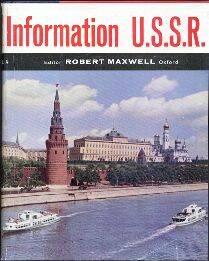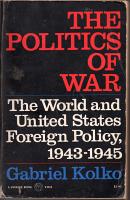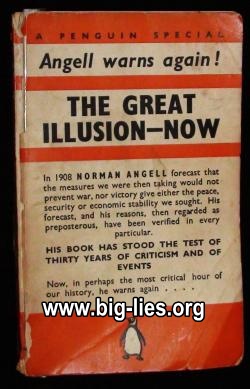
Ralph Norman Angell Lane THE GREAT ILLUSION - NOW
• The Great Illusion was first published in 1908 (& on other publication dates before the 'Great War' starting 1914). It was the most advertised, discussed, and sold 'pacifist' book on supposed causes of wars.
• A 1933 edition was rewarded with a ' Nobel Peace Prize' the following year.
• The edition reviewed here was printed in December 1938 (described as ' The 1939 Edition'). It consisted of a long introduction, followed by an edited-down version of Angell's pre-Great War book.
• Published by Penguin Books
Warning: this is a full-on revisionist review, so far as information permits.
 Fake pacifist Jewish-concern book, which misled many peace-inclined people. Part of the Jewish propaganda leading to the Second World War with Germany. However, it had the merit of directing attention to economic causes of wars. Fake pacifist Jewish-concern book, which misled many peace-inclined people. Part of the Jewish propaganda leading to the Second World War with Germany. However, it had the merit of directing attention to economic causes of wars.
Here I review Norman Angell's books, emphasising the way he switched to anti-Germanism, along with Jewish policy, in the 1930s. I have included notes on war aims, for both world wars, and the reasons that clear statements of them were impossible. I've found a speech of Balfour, made in 1920, and quoted from that. And information on 'Penguin Specials', and an appendix from C N Parkinson's Left Luggage (1967) on Victor Gollancz's so-called 'Left Book Club'.
Radio—i.e. in Britain the BBC (British Broadcasting Company, nationalised and renamed the British Broadcasting Corporation in 1926, after the General Strike)—is not dealt with here. Nor are the daily press and magazines, moving pictures, lectures and public meetings, or explicit campaigns of violence.
Angell and the World (1908-1938)
[ Top of page ]
This book (see photo) was a 'Penguin Special'—a series, which continued for many years, of books nominally intended to consider serious issues. In fact from today's viewpoint it obviously presented the Jewish view, insofar as this percolated to the various levels of people who considered themselves 'Jews'. Penguin to some extent supplemented and took over took over from the 'Left Book Club' of Victor Gollancz, (Victor Gollancz Ltd, London, Covent Garden), which ceased publishing in 1948. See below for the Left Book Club.
Norman Angell is now almost a forgotten figure. His surname was Lane; possibly (this is a guess) he dropped the name after a scandal involving Homer Lane, a once-well-known figure in what might now be called 'alternative education'. I'm assuming that Lane was in fact a Jew, on evidence of his names (see the Avotaynu Jewish surname index), the obscurity of his early life, and his writings.
Angell was a journalist, roughly equivalent to such people as Tony Benn, George Galloway, Dennis Skinner and others, but there's no modern equivalent, because the Jewish nuclear frauds have made Angell's military assumptions appear to be redundant. H G Wells's Experiment in Autobiography says Lord Northcliffe 'ran' Angell for a while, when it dawned upon Northcliffe's chaotically uninformed mind that newspaper proprietors have responsibilities, after the shattering experience of WW1 showed the 19th century assumption that events would work themselves out by laissez faire had failed. (Northcliffe may have had a parallel in the founders of Youtube—offering home videos of cats and babies, but then exposed to a disconcerting deluge of critiques and social comment).
And Angell could be compared with Coudenhave-Kalergi, a propagandist, secretly paid by Jews, for a mestizo Europe. In a similar way, Angell, pretending to be a rational debater trying to avoid war, was a propagandist for Jewish aims.
Angell is an interesting example, with such people as Henry George, Hobson, Kidd, Shaw, Belloc, Wells, Russell, H N Brailsford and sundry others, of the ego-centred journalist who never came to grips with critics. These people tended to borrow from each other both with and without acknowledgement; and they could make more money from books and pamphlets and fame than from getting together and hammering out details. At the time Angell wrote, there were no electronic media, so that books, the press, and the free press  were the equivalent of preachers and political pamphleteers. And of course as Belloc pointed out, many points of view were censored by the usual processes.
Pacifism
[ Top of page ]
Arguably the first modern pacifist book was Tolstoy's War and Peace (completed 1869), dealing with the Napoleonic Wars and of course the French and others invading Russia. Tolstoy had no idea about the Jewish underpinning of Napoleon  ; I don't think there's a single Jew in his vast novel. Or at least it seems so. ; I don't think there's a single Jew in his vast novel. Or at least it seems so.
1889 saw the publication of Baroness von Suttner's 'Die Waffen Nieder' a fictional autobiographical story of 'Martha von Tilling'. As far as I know it was translated into English in 1908 as 'Lay Down Your Arms!'. 1908 seems to have been the publication date of another book on war and peace, 'The Great Illusion' . H N Brailsford wrote that not since Paine and Cobbett had there been a pamphlet that so 'riveted the attention of a continent'. It's possible this publicity reflected Jewish attitudes at the time: the 1903 war of Japan on Russia, financed by Jews, had not been a great success. Jewish assassins had regular kills, but the results, again, were not encouraging to them. Belloc said: 'The immeasurable catastrophe of the war—with which the Jews had nothing to do and which their more important financial representatives did all they could to prevent—fell upon Europe.' Belloc didn't know about, or perhaps didn't notice, the founding of the 'Fed' in 1913, though he did understand war profits made by Jews.
One thesis of this review is that Jews, before 1914, stated, or claimed, or protested, that they opposed war in Europe. (The rest of the world, such as China and India and South Africa, was of course liable to pillage). Angell was part of this unlikely claim, and his book was an unsound attempt to debunk warlike ideas. However, after the war and the Russian coup d'état against Russia, Jews gained more practical experience of mass deaths, and, funded by The Federal Reserve and backed by immense Jewish-run propaganda, came more and more to favour war. By 1938, they were very keen for others to fight their wars and die in large numbers, and Angell follows this pattern precisely. His 1938 book is a tissue of weak analogies and badly-argued bits and pieces; the 1908 edition is much more uncertain.
It's very much worth noting Angell's complete absence of feeling for victims, the dead, the massacred, and so on: his entire world is finance, money in circulation, and trade. I suspect this accounts for much of the impact of Angell's book: a large part of the then-education system was descriptive material on wars and empires. Caesar's wars, the Trojan Wars, Agincourt, medieval battles, the glories of Nelson, wars in Africa such as the Ashanti war (1874), flag-wagging, and so on. Many people thought that style of education was wonderful: the late Hugh Trevor-Roper (renamed Lord Dacre) believed, astoundingly to me, that Latin, Caesar, and the rest was the ideal education for public schoolboys with empires to run. The attitude that it's sordid to talk about money when discussing the glories of war must have clashed at a profound level with Angell's work. Both views paid little attention to casualties—and, for officers on the heavily-armed side, this made sense. Angell's popular examination of war as something to be explained rationally looked, at the time, like a breakthrough in economic determinism, weakening the great generals and decisive battles theory. It must have been comparable in influence to J A Hobson's Imperialism (1902), which was obviously fired by the Second Boer War. Hobson was about fifteen years older than both H N Brailsford and Angell.
I suggest enthusiasm in the press, which of course was largely Jewish, was a sigh of relief at Angell heading off awkward questions about Jews, South African gold and diamonds, opium, and dead soldiers and Africans. Brailsford's War of Steel and Gold postdates The Great Illusion by about six years, and although it is in many ways, as the title suggests, a more realistic book, it did not mention Jews either. 1900-1914 saw some analysis of Jewish power, but it remained suppressed and unnoticed, rather like early opponents of the Roman Catholic Church. It's fair to say there was no general theory of war and peace.
Angell seemed to be a pacifist, and his name was associated with pacifism, but as far as I know no critic realised Angell was part of the concealment of Jewish aims. I may be wrong here; it's likely his name was circulated amongst the few published commentators on Jews, but their works were circulated more or less secretly, could only be reproduced by copying, and never reviewed in the large-scale media. My evidence for his pro-Jewishness is partly that no coherent view emerges: he is difficult to review because of this, so forgive my rather unsuccessful attempt to summarise his morass of half-truths.
Angell was advertised as an analyst of war and peace, like Hobson in Imperialism, or a non-technical Lewis Fry Richardson.  He complained of being misquoted for over quarter of a century by newspapers, as the 'man who proved war is impossible'. Mechanised warfare was an increasingly obvious menace, even to the most hard-hearted, just as mechanised production and distribution raised new human issues. But, just as the British Labour Party appeared to be serious in tackling work-related issues (but is now, with its record in supporting genocides, mass population transfers, forced race mixing, paedophilia and other evils, clearly seen as a fake) so the pacifists turned out to be a series of intellectual mirage-peddlers. In each case, people concerned about the future were duped, and their time wasted. But they did little. He complained of being misquoted for over quarter of a century by newspapers, as the 'man who proved war is impossible'. Mechanised warfare was an increasingly obvious menace, even to the most hard-hearted, just as mechanised production and distribution raised new human issues. But, just as the British Labour Party appeared to be serious in tackling work-related issues (but is now, with its record in supporting genocides, mass population transfers, forced race mixing, paedophilia and other evils, clearly seen as a fake) so the pacifists turned out to be a series of intellectual mirage-peddlers. In each case, people concerned about the future were duped, and their time wasted. But they did little.
Angell and Events Following 1914
[ Top of page ]
The first part of the book (about 100 pages; about half the total) is Angell's comment on his earlier book, and on the state of the world in 1938. His nominal intention is prove he was right thirty years earlier, and presumably therefore a valuable commentator in 1938. (The jacket says 'His forecast [of war and insecurity], and his reasons, then regarded as preposterous, have been verified in every particular.') Let's try to examine this impressive claim.
At the start of his book, Angell says In 1914 we [sic] entered war which was to vindicate the rights of small nations (... Serbia ... Belgium...); to remove the menace of Prussian militarism; to end war; to make the world safe for democracies; to make this and other free countries [sic] secure from aggression, and place their economic life on safe foundations. Readers may remember the object of the Second World War was supposedly to come to the assistance of Poland—a war aim immediately dropped when Stalin invaded Poland, and clearly not the aim of war: in fact, the Second World War was to defeat Germany completely, strengthen Stalin, killig many non-Jews in the process, and remove non-US empires, leaving Jews in control. Similarly, we don't have to take Angell's comment very seriously; not only is there no source for it, and not only are there multiple war aims, of which 'war to end war' was a slogan by H G Wells invented only after the war was started. Below is H G Wells on war aims; he was in charge of propaganda in Germany, and presumably knew what happened. Wells had no idea that Jews had any issues. He was baffled by the War Office's refusal to state war aims. But it's clear now that the war aims would not have been acceptable to large numbers of people. The aim to 'place their economic life on safe foundations' presumably means Jewish capital, which the 1913 Fed established as a new factor in modern life. So Angell starts immediately with dishonesty.
Events after 1914 are treated from a pro-Jew viewpoint. The introduction of conscription, when after a gung-ho interval young men realised they would die at the front, is not mentioned. The withdrawal of gold currency and the replacement paper ('Bradbury pound'; in Germany, Rentenmark) is not mentioned. Nor is the Bryce Report, a solemnly promoted series of atrocity story lies aimed against Germany. Nor is the German peace offer of 1916. Nor is Balfour's 'Declaration' on Israel: see below for Balfour speaking in 1920 with his 'assured indolence' (H G Wells), and infantile Biblical viewpoint, and the machinations to get the USA into the war. Nor the shipping bait deliberately offered for Germany to sink. Nor the sea blockade, and German starvation.
And that's just the wartime period: Angell calls the USSR 'Russia', a common deception at the time, as it was under Jewish control both within and from money controllers outside. The murder of the Tsar's family is not mentioned. The USSR's Jewish money, paid via Lenin and others to foreign companies for weapons and so on, is not mentioned. New York Jews declaration of economic war against Germany, Hitler's opinions, the Great Depression and all the rest go unmentioned.
Should Britain's government have declared war on Germany? An interesting possibility (not in Angell) is that Britain might have remained neutral, not declaring war on Germany. After all, Napoleon had invaded the German territories a century before; the Germans fought back sixty years later; Europe had had many wars; why bother about Germany? This was Bertrand Russell's view. But there had of course been a very long preparatory propaganda campaign in Britain against Russia and Germany, the media then (before radio, before TV) being printed, and with some material from speeches, music hall songs and popular education. Here's a comment from Bertrand Russell written about forty years after the 'Great War': '.. the consequences of a German victory in the First War would have been ... less deplorable than the consequences of our victory. ... militarism has steadily increased since 1918. ... democracy has steadily diminished. ... it was followed by an even worse war.' But, as I say, this option is ignored by Angell.
A Note on Angell's Writing Style and Claim to Clarity
[ Top of page ]
Readers who take an interest in Jewish deconstruction will be aware that Jewish writings are generally rambling, confused, and lacking in focus. It's easy to see why: if a writer's aim is to say anything which he/she's been told is in the interest of Jews, it is not likely to appeal to anyone else. Hence the wheedling irresponsible irreleventsia of most Jewish writings. Chomsky, Sontag, Derrida, Freud, and endless media nonentities illustrate the process. A related aspect is the repetition of lies, something recommended by Jewish traditional books. Repetition of approved memes, and omission of other memes, gives many Jewish writers a similar flavour to each other, as they recount the same tired material, singing from the same handouts. Their natural dullness seems to rule out anything original. Even when they do troll, spam, and distractionary work, they don't seem able to do more than ransack the world for old ideas—Jewish spam sites are full of Jesuits, Illuminati, ridiculous anecdotes about Germans, fantasy stories about ill-treatment, hollow or flat earth ideas, endless repeats of slang words, discredited junk of all types.
[Here's a shortish footnote from Angell (p. 190) which amused me as being incomprehensible, because of assumptions made: A Bill has been introduced into the Indian Legislative Council enabling the Government to prohibit emigration to any country where the treatment accorded to British Indian subjects was not such as met with the approval of the Governor-General. "As just treatment for free Indians has not been secured," says The Times, "prohibition will undoubtedly be applied against Natal unless the position of free Indians there is ameliorated." —you can say that again!]
Angell was 'boomed' (Belloc's and others' word for 'hype') freely. The Penguin cover absurdly states HIS BOOK HAS STOOD THE TEST OF THIRTY YEARS OF CRITICISM AND OF EVENTS. Around page 21 Angell plaintively describes how he tried to persuade everyone of the truth of his views.
Angell and his promoters took pains to assure the reader that Angell is a crystal clear writer, though they are less clear why this lucidity should need hundreds of pages of exposition. Tucked away near the end of his 1938 material (p. 106) is this comment: 'Hardly a critic dealing with this book but refers to its clarity and simplicity.' He gives no examples, unsurprisingly perhaps in view of his tedious style. And in his original book we find something similar, worth quoting from:
(Pages 136-139) ... complete exposure of the fallacy .. repose[s] .. upon the simplest statement of the plainest facts in the economic life of Europe.. points 1 to 6. Angell claims that only six plain, simple facts are needed to understand his thesis of illusion, 'verified in every particular'. Here they are (edited down; remember they were written around 1908, before the 'Great War')–
• [1] An extent of devastation, even approximating to that which Mr. [Frederic] Harrison [in a letter to the Times] foreshadows, as the result of the conquest of Great Britain, could only be inflicted by an invader as a means of punishment costly to himself, or, as the result of an unselfish and expensive desire to inflict misery for the mere joy of inflicting it. Since trade depends upon the existence of natural wealth and a population capable of working it, an invader cannot "utterly destroy it" except by destroying the population, which is not practicable. if he could destroy the population, he would thereby destroy his own market, actual or potential, which would be commercially suicidal. ...
• [2] If an invasion by Germany did involve, as Mr Harrison and those who think with him say it would, the "total collapse of the Empire, our trade, and the means of feeding forty millions in these islands ... the disturbance of capital and destruction of credit," German capital would, because of the internationalization and interdependence of modern finance, and so of trade and industry, also disappear in large part, German credit also collapse; ...
• [3] For allied reasons the exaction of tribute from a conquered people in our day has become an economic impossibility; the exaction of a large indemnity so difficult and so costly directly and indirectly as to be an extremely disadvantageous operation.
• [4] For reasons of a like nature ... it is a physical and economic impossibility to capture the external or carrying trade of another nation by military conquest. ... if Germany conquered Holland, German merchants would still have to meet the competition of the Dutch... the notion that the trade competition of rivals can be disposed of by conquering those rivals being one of the illustrations of the curious optical illusion which lies behind the misconception dominating this subject.
• [5] 'The wealth, prosperity and well-being of a nation depend in no way upon its military power, otherwise we should find the commercial prosperity and the economic well-being of the smaller nations, which exercise no such power, manifestly below that of the great nations which control Europe, whereas this is not the case. ... Not only the question of the security of small States, which, it might be urged, is due to treaties of neutrality, is here involved, but the question of whether military power can be turned in a positive sense to economic advantage.' (Pages 207ff) Angell's explanation of Holland, Sweden and so being rich per head doesn't explain why they are left alone; Angell doesn't consider why they aren't simply looted. Angell does seem to recognise that the steppes of Russia or vast plains are hard to defend, which may have something to do with lack of big settlements. Angell doesn't seem to realise building towns and communities is expensive and must incur a long risky interval.
• [6] No other nation could gain material advantage by the conquest of the British Colonies, and Great Britain could not suffer material damage by their "loss," however much such "loss" would be regretted on sentimental grounds, and as rendering less easy a certain useful social co-operation between kindred peoples. The use of the word "loss" is misleading. Great Britain does not "own" her Colonies. They are, in fact, independent nations in alliance with the Mother Countries.
Analytical Material Missing from Angell
[ Top of page ]
As can be seen from his six principles, Angell has no fully abstract statements. This of course is in full accordance with Jewish verbal outlook, which usually relies on silly tricks, and has only one object, namely to support what are thought by the simple to be Jewish interests. For example, someone might consider countries A and B, and the effects on them of war with C. How much men and materiel could be expected to be lost on both sides A and B, and to what aim? Would this benefit onloooker C? Or try to analyse out the need for physical objects. Or analyse types of weapons, and see what effects might be predicted if (say) defence gets stronger, or attack gets stronger. Or decide what exactly is meant by 'wealth'. Or by 'finance' and 'interest'. Or the needs for raw materials. Or the conditions in which one group is strong enough to profit from another group.
Angell does seem aware of such a need: at the extreme end of his pre-First War book he says, correctly, a new science is needed, of International Polity, the science of the political relationship of human groups. Implicitly he admits to being unable to contribute.
Angell's six points are hard to criticise well, because they are at different logical levels and in any case don't fit together or make a complete theory.
• [1] Comments on physical destruction, which varies with technical 'progress'. The Jewish myth of 'nuclear weapons' in 1945 or 1946 made this seem out of date; in any case, when it was written, high payload bombing planes were in the future.
• [2] Wonders about the collapse of the British Empire, but all Angell says is that credit would be interrupted, as though that's the most important thing. If it is in fact important, maybe because things essential to both sides are essential, he doesn't prove it.
• [3] The 'exaction of a large indemnity' proved difficult with Germany, partly because the amounts were miscalculated. (See Keynes 'Economic Consequences of the Peace' on the value of ores, and commentators on the total amount of gold in the world). On the other hand, 'exaction' by central banks have proved extremely rigid and durable.
• [4] Looks at trade competitors. It's well-known that there were disputes over tariffs and trade, even to the point of threatening wars. So presumably 'trade competition of rivals' can in fact be affected by military means.
• [5] Claims the wealth of a nation depends 'in no way upon its military power', giving such examples as Belgium and Switzerland. A serious investigation might correlate wealth and military power across the world. And back in time, for that matter. Is there 'in no way' any connection?
• [6] Says British colonies are independent; I think he says this to pretend the Boer War did not benefit Jews, who owned the new gold and diamond mines, but military power was an essential step; Angell prefers to pretend the mines came into being autonomously. He writes (pp 192-3) that after the Boer War the gold mines 'are owned by shareholders', and pretends that military power was irrelevant!
[Pages 206-7 have another five points, on conquests, expanding populations, and large groups as opposed to many smaller groups. He compares north America with many Indian tribes with total populations in 1908, absurdly ignoring technical issues. I haven't included this material, but it shows the same pattern as his six points, i.e. selectively picking bits and pieces]
Omissions For a fairly hefty book, Angell's factual omissions include the Monroe Doctrine and its affects on the entire western hemisphere; steel and oil; canals, and air power, and earlier transport systems. The American Civil War is omitted, despite the fact that at the time it was one of the largest recent wars, with financial implications. So is explanation of the Franco-Prussian War. The war of Japan on Russia in 1903 is unmentioned; so is the fact it was financed by Jews. Another oddity is that Hitlerism is there, but not Mussolini, although Mussolini was widely considered at the time to be more 'charismatic' than Hitler.
Another highly significant omission is the detail of weaponry and manpower; the sheer cost, which, in view of the primacy Angell gives to costs, needs explanation. In the 1908 book, there's detail on reparations made after Franco-Prussian War, and the (presumed) effects on Germany and France; payments from Europe to U.S.A.; Agadir incident; Boer War. Angell is very careful to ignore war profits. Another oddity is omission of Jean Renoir's 1937 film 'La Grande Illusion'—I'd guess because Jews wanted France to fight for them, rather than be neutral or pacifist.
A difficult-to-judge omission is general history. The Norman Conquest is an obvious example. Angell shies away from discussing its effects. He does talk about the heptarchy in England, and 10th century Vikings. He mentions the 'Grand Design of Henry IV - 'perfect save no earthly prince would agree to it'. He has no overview at all of India and the British Empire: Good? Bad? A mess? So Angell's implicit claim to a sort of general-purpose overview fails.
For reference, here's a contents list summary of The Great Illusion - Now:
PART I: THE GREAT ILLUSION, 1938
RELEVANCE OF THE BOOK TO PRESENT PROBLEMS
PART II THE GREAT ILLUSION, 1908-14 [Pp 115-282. In larger type than the rest of the book, suggesting the type hadn't been reset. Edited-out sections not marked]
I ECONOMICS AND THE MORAL CASE FOR WAR | II THE ACCEPTED AXIOMS | III THE GREAT ILLUSION | IV THE NEW WORLD AND THE OLD POLITICS | V FOREIGN TRADE AND MILITARY POWER | VI HOW COLONIES ARE OWNED | VII THE INDEMNITY FUTILITY | VIII CONQUEST AND THE POPULATION QUESTION | IX "BUT SOME PROFIT BY WAR" | X HUMAN NATURE AND HUMAN INSTITUTIONS | XI FAITH, FORCE AND THE WORLD'S ORDER | XII WHAT MAKES US FIGHT? AND NEED WE? | XIII CONCLUSIONS
PART III THE VERDICT OF THE EVENTS/ THE FINAL MORAL [Pp 277-282]
Dubious Material Present in Angell
[ Top of page ]
I'll try to list questionable material to be found in Angell. That is, assumptions he made, many of them common newspaper currency at the time, which nevertheless are of doubtful truth. Many of these memes persisted for many years, and probably many of them will be recognised by readers.
• (Pages 127-134 or 100-114 in the 1908 edition) 'The Accepted Axioms'. This chapter consists of a long list of extracts from books, articles and letters taken from British and German writers, none of them historians or technical experts. The writers are all male; they all omit the US Civil War, the then-recent war of Japan on Russia, even France and Napoleon. They are full of survival stuff, need to fight, importance of navy etc. Certainly the impression is they simply have no serious overview. Because newspapers have some cachet, a bit like the residual feeling that the BBC is worth listening to, newspaper clipping books were popular at the time. The then-equivalent of sound bites or Internet comments. But as analytical material they are not usually of much value.
• Weaknesses of democracy: Angell maintains time after time democracies override experts and make mistakes because of their passions. As far as I could find, he gives not one example. Probably this was a typically Jewish attitude; they didn't feel part of any democracy. Page 104: '... the voting millions who do not hesitate ... to over-ride the specialist or expert..' Really?
• (page 89) The 'transfer difficulty', '.. goods and services ... difficult to transfer to the creditor [i.e. victor] without financial and economic dislocations..' Angell only considers goods and services. He omits things like slave labour, raw materials, such land as Greek islands, historical treasures, prostitution, constant repeated payments (e.g. Danegeld, though Angell seems not to know about this), slave labour, cash crops for little money (e.g. grain extorted from Ukrainia by Jews in the USSR). Page 145: '... military conquest ... cannot involve a transfer of property from one group of owners to another..' is taken from the pre-war book. I wonder if he changed his mind after Balfour announced the Declaration with its Rothschild link?
• 'Britain can't feed itself' was a popular meme at the time. True? False?—Angell has no evidence
• (Page 216) Angell says (in effect) that international finance has an interest in stability. From the point of trade, this may be true, but even before 1914 the were obvious possibilities in controlling money to cause depressions, funding wars—as should have been obvious from Napoleon. Angell was unaware of, or a distraction from, the manipulation of money itself.
• (Page 243) Angell says that if a state conquers another for (e.g.) warm water access etc, then irredentism invariably follows. (I.e. demand that it be given back). Angell's example is Ireland, at the time part of Britain. But why should that always apply?
• Angell has a very dishonest argument about 'dumping': he states that if food etc were stolen, and taken Viking-style back to Britain, and dumped on the market, "we" would complain. This of course assumes the demand is already met. In fact, gems from India, tea, chocolate, silver, mercury, coal stolen from anywhere can add directly to national wealth, just as a household of thieves enriches itself by theft of almost anything.
• (Page 252 example) Angell assumes, or pretends to assume, everyone's the same: he evinces no knowledge of Talmudic Jewish anti-white hate. He assumes, or pretends, that civilisation is permanent. Two typical quotations are: 'At one time [in history] we want to eat our enemies, to burn heretics, kill our neighbours in duels, burn negroes'. '.. our forbears regarded as .. right .. human sacrifices, slavery, polygamy, autocracy, judicial torture, the duel'. (p. 271) This of course is a tempting line: many people accept whatever happens in their time. At the time Angell wrote his revised edition, Jews in the USSR had murdered and enslaved and tortured tens of millions.
• Angell seems to have no doubt that a people are represented by their government. He doesn't point out (at least in his 1908 edition) that 'government' can be a synonym for oppression. In view of Jewish comments on the Russian Tsardom, this seems odd; probably the ambition of Jews to displace them accounts for Angell's myopia.
• Angell looks at the 'human nature' argument (p 225). However, he has no analysis: what if one group can easily overpower another? What about propaganda: Angell believes in spontaneous swings in the public mood, the country becoming excited, calls for this and that, and seems to be unaware of long-term propaganda campaigns backed by money, such as Jews specialise in. But would Britons have wanted to fight Germany without years of propaganda? After many centuries, the Jewish attitude has permeated deeply. But Angell does not consider anything of this sort. he also looks at the Avarice and Greed theory (pp. 92-3), though, again, not in depth.
• Angell is tiresomely dishonest about colonisation. He quotes a letter in a newspaper stating that's it's surely obvious that Japan could benefit from gaining control of New Zealand and other territories, and the navy prevents 'her' from doing so. A good test of Angell's work, theoretical and not too personal. But Angell's reply deals only with the Japanese invasion of Manchuria, and even there he treats it as an area to plant Japanese populations in competition with the local Chinese. Angell simply has no overarching theory, with an obviously correct remark which settles the matter. The question about New Zealand was ignored.
Changes in 1938 Edition of Angell's 'The Grand Illusion'
[ Top of page ]
As would be expected, looking back, Angell takes the Jewish side. He wants war, but has to pretend he's being cautious. His book is part of the entire propaganda push for Churchill to start bombing.
• He branches into a discussion of 'Nationalism' which is undefined. Topics include e.g. the hypocrisy of Poles over Ukrainia, and Germans over parts of Poland, and Italians over Tyrol etc. No mention of Jews. However, there is a meme which writers of the time often quote, namely that Nationalists in one nation are opposed to Nationalists in another nation. Nationalism leads to war! So nationalism is evil. This is a common theme among Jews. Page 94: '... if there were no sovereign nations, we could not have international war...' Is it true? Well, maybe. But maybe wars were fomented by Jewish money and promises?
• Psychology of encirclement: Angell recognises that 'Germany must feel "encircled in iron"..'. The Soviet Union after WW2 claimed it felt 'encircled' though we now know the nuclear aspect was Jewish-run, and deliberately invented. Angell has no way to analyse the problem of bases dotted around the world.
• Page 26 gives Angell's views on the 'need for close co-operation with Russia'. (Meaning Stalin's USSR). '... [I]t is patently impossible to create a balance of forces in Europe which can meet the totalitarian challenge without Russia'. This is pro-Jewish, of course. Angell simply ignores mass murders in the USSR, and even pretends it is not 'totalitarian'.
• Angell also perhaps spills the beans about China: (p 26) '... aid to the governments of China and Spain engaged in resisting totalitarian invaders..' suggesting that China in addition to Spain of the 'Civil War' were subject to Jewish intervention.
Conversely, Angell did not want an 'Alliance with Germany to permit the destruction of French democracy and the dismemberment of Russia? And with Japan to pick the carcase of China?' Suddenly Angell says that property etc can be transferred. And military action can remove hostile elites. From the Jewish point of view, the second-to-last thing they wanted was the USSR to be exposed.
• Page 29: Angell talks about the 'Left'. At this time, Angell takes up the idea that the German NSDAP was 'right wing'. On balance Jews in Britain preferred to keep Labour voters deceived about Germany, presumably because they would be needed to fight and die.
OTHER BOOKS BY NORMAN ANGELL
[ Top of page ]
Four other books by Angell.
• 1903 Patriotism under Three Flags: A Plea for Rationalism in Politics on the US war with Spain mostly over the Philippines (Picasso hated this US intervention) and with notes on 'the Dreyfus affair'. My guess is this book was not much read. It may have been written to misdirect from Jewish finance acting through the USA. As far as I know, revisionism of this period is relatively recent, within the USA, though Japan may be a different matter. The false flag explosion of the Maine marked its beginning.
• 1928 The Money Game appears to be a large hardback book, but in fact is hollow, containing cards and a game relating to money. I have a copy which I haven't examined carefully. But no doubt there is careful avoidance of Jewish issues—that's my hypothesis.
• 1939 You and the Refugee by Sir Norman Angell & Dorothy Buxton. 'Refugees' do not of course include displaced Russians or Germans or Chinese or Indians or French. The subtext is: Jews only. Or Jews first; typing this now (2019) it's clear that displacement of whites is a Jewish aim. H G Wells reviewed this book, with some irritation:
Sir Norman Angell and Mrs. Dorothy Frances Buxton, in a very clear and almost pressingly persuasive book, You and the Refugee (Penguin Books, 1939), argue for a practically unrestrained admission of these outcasts. They show in particular how beneficial a large refugee immigration might be to the British Empire. It would bring in new trades, new skill, find fresh work for the unemployed, and in Great Britain arrest the approaching decline in population - if that is desirable. Their plea for a more generous treatment of refugees, so far as assimilable individuals are concerned, is unanswerable. [If the stories are true, and if other stories haven't been censored—rerevisionist]
But our authors' arguments for an inassimilable immigration en bloc are less convincing. That would only renew the trouble at a later date. There is no time to begin that old history again in new regions and among fresh difficulties. Disaster is advancing too rapidly upon our entire species. Jewish nationalism like every other nationalism must end and end soon...
• 1947 The Steep Places is a miscellaneous book by someone no longer taken very seriously. He couldn't decide whether colonies still existed or not; whether Stalin should be opposed or not; whether military alliances should exist (or could - he must have believed in atom bombs); whether the USA had a new empire, or not; whether 'reds' were good, or not; what to make of historians like Nevins and Commager; what to make of Americans and the 'Ancient Grudge' against Britain. I think he must have been excluded from the central Jewish decision makers.
BALFOUR ON GREAT BRITAIN AND ZIONISM
[ Top of page ]
Speech at the Albert Hall at a Demonstration organised by the English Zionist Federation, to thank the British Government for a decision to incorporate the Balfour Declaration for a Jewish National Home in the Treaty of Peace with Turkey. July 12th, 1920.From Speeches and Addresses of the Earl of Balfour KG, OM, FRS 1910-1927
[Balfour speaks:] For long I have been a convinced Zionist, and it is in that character that I come before you to-day, though in my most sanguine moments I never foresaw, never even conceived, the possibility that the great work of Palestinian reconstruction would happen so soon, or that indeed it was likely to happen in my own lifetime.
This is one of the great and unexpected results of the world struggle which has just come to an end—even if, indeed, we dare to say that it has yet completely come to an end.
Of infinite evils that struggle has been the parent, but if among its results we can count the re-establishment in their ancient home of the Jewish people, at all events we can put to its credit one great result which under other circumstances, so far as we can see, could never have occurred at so early a date.
Who would have thought five or six years ago that a speaker in the Albert Hall would be able to recount as an established fact that the Great Powers of the world had elected to accept the Declaration to which Lord Rothschild has referred, had consented to give a Mandate to the country which at all events is in the forefront among those who desire to see this policy brought to a successful issue, and that they would already have seen appointed as the High Commissioner of Palestine a man who so admirably joins the double qualifications which Lord Rothschild has so felicitously expressed? ...
J A HOBSON Despite huge output remained isolated
[ Top of page ]
John Atkinson Hobson (1858-1940) was I think English. He lived through the South African wars, the 'Great War', and the 'Great Depression'. He is said to have opposed Jews, but was not very effectual. He has a place here because Lenin supposedly made use of Hobson's Imperialism, but of course was a Jew. I suspect Hobson was kept out of academic life; he seems weak on the East India Company, and his detailed research suggests he didn't have much access to papers, and judging by his output, he relied on his books to maintain his income, and perhaps because of that did little to write crisply and concisely.
One of the ways Jews infiltrated ideas was by multiplying slogans, phrases, ideas which handily implied misleading concepts, and all the rest of it. But Hobson seemed to lack that facility. He wrote on underconsumption, which surely is simply a result of technological increases in some types of productivity. Production of weapons such as revolvers and field guns resulted from productivity increases. But I don't think he worked out alternatives, any more than people supporting Luddites were able to work out some way to spread out the gains from fabric technologies. Or medical people can find an alternative to the absurd COVID-19 hoax largely caused by the conquest of medical problems.
Hobson, because of his attempts to work social theories into economics, was often actually called a 'Marxist'. Some of his books are included in marxists.org and Alvin Saunders Johnson of the New School of Social Research reviewed Hobson—and also got Jews from Germany into the USA. These days, thanks to the work of Miles Mathis, people are seeing through Jewish deception, but it has taken more than a century. Of course Jews noticed him; it's amusing to see the dishonest stuff about him in Wikipedia etc. Hobson doesn't seem to have identified the problems with the Federal 'Reserve'. And his books on the Great War and subsequent events seem feeble. I'm all but certain he would not have identified either World War as arranged by Jews and others. He even regarded himself as a follower of Keynes. Perhaps he was lucky to die before the Second World War was under way.
As a writer, I fear I found him endlessly verbose, maybe following the rules for good English which he may have had forced into him. There is probably some valuable material in Hobson, but I fear it will not be easy to find.
Rae West 2 Feb 2021
H G WELLS ON WAR AIMS DURING THE GREAT WAR
[ Top of page ]
Taken from THE OUTLOOK FOR HOMO SAPIENS; Readers Union copy 1942. H G Wells's own account of the First World War, and his attempt to get a statement of war aims. Of course, from a modern perspective, support of Jewish aims and money-making for Jews, and this sort of thing made up the true war aims, would not be acceptable. Wells, naïvely unaware of secret Jewish pressure, must have been treated as a propagandist, all the more useful because he had no idea of hidden forces. Hence the varying and obviously insincere claims made after th war.
'... As the first world war unfolded my mind was increasingly obsessed by the problem of how the war would end and what would come after the war. Imaginative people were guessing and inferring and making plans. The word "plan" became more and more frequent; at length no newspaper was complete without it. A Ministry of Foresight was suggested. We busied ourselves in making the New Map of Europe, the New Map of the World. The idea of a "League of Nations" emerged amidst this ferment of anticipatory projects. An interesting phase in all this forward-looking peering was the War Aims controversy. I happened to be working in Northcliffe's Ministry of Propaganda in Enemy Countries [See ' See Secrets of Crewe House' by Sir Campbell Stuart.] I was in particular directing the propaganda in Germany, and, in co-operation with Dr. J. W. Headlam-Morley, I induced our Crewe House colleagues to draw up a memorandum upon the allied war aims and submit it to the Foreign Office for endorsement. "This", we said, "is what we suppose we are fighting for, and if we can get this we shall be satisfied and the war will be at an end. Is that so? We cannot go on with our work properly unless we know its objective." The War Office was profoundly shocked. Whatever else in the world had been affected by the rotation of the human mind towards the future, the Foreign Office has remained immune. There, at any rate, war was what it always had been. You fought your way to your enemy's capital and you then "dictated terms". The objective of a war was victory. To reveal your terms beforehand was not done. So the Foreign Office never committed itself to a binding endorsement of our War Aims Memorandum, and it never warned us of various secret understandings that affected it. It remained in the self-satisfying pose of a superior body tolerating us and using us according to the best diplomatic traditions. And at length at Versailles the terms were dictated...'
Page 99 of Angell has a footnote:
... from the five-volume History of the Peace Conference of Paris, Institute of International Affairs: "The war was a conflict between the principles of freedom and of autocracy, between the principles of moral influence and of material force, of government by consent and government by compulsion"
It's amusing they couldn't bring themselves to mention 'democracy' as an aim amid their nonsense.
 864 pages.
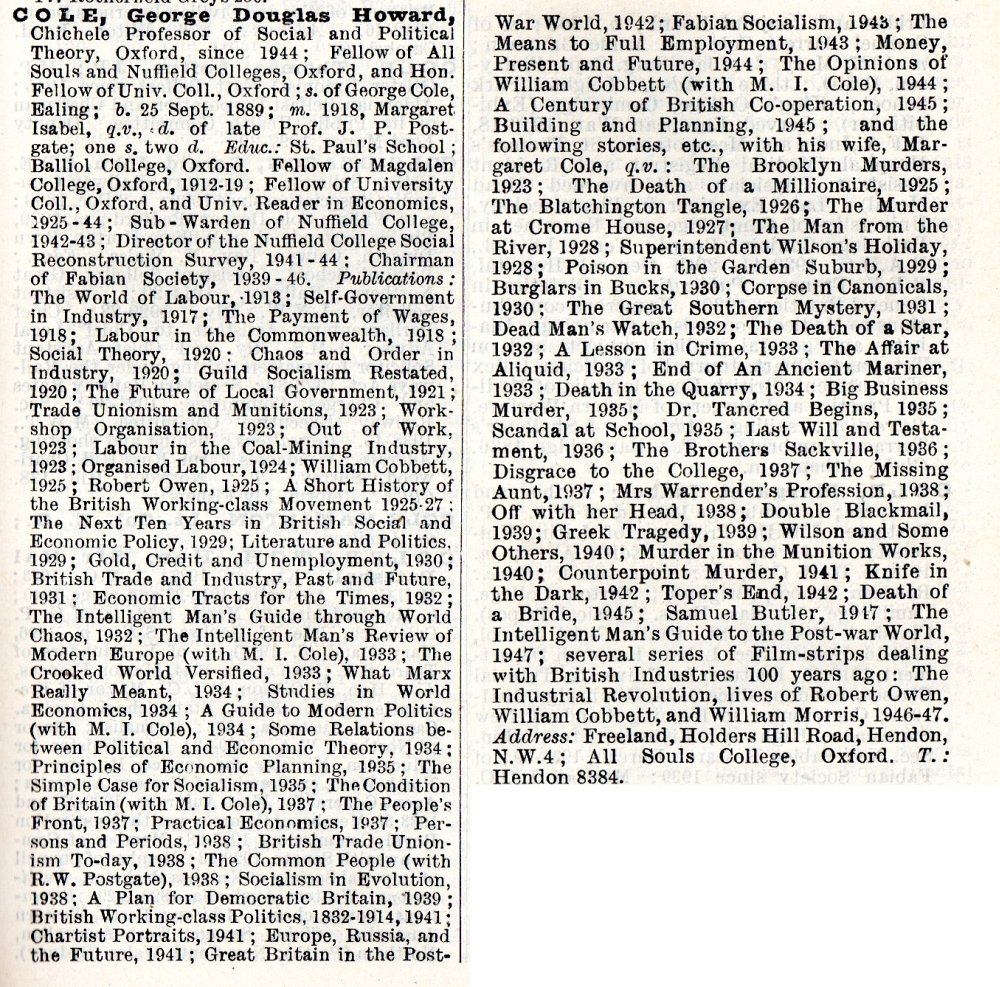 Jewish money enabled the purchase of partly-educated Britons and crypto-Jews. The 'Labour' Party had many people with public-school education who could find no other paid work. (Note the absurd list of detective stories by both Coles).
G D H Cole & M I Cole: The Intelligent Man's Review of Europe To-Day (published 1933) published by Victor Gollancz Ltd, London. Jewish money enabled the purchase of partly-educated Britons and crypto-Jews. The 'Labour' Party had many people with public-school education who could find no other paid work. (Note the absurd list of detective stories by both Coles).
G D H Cole & M I Cole: The Intelligent Man's Review of Europe To-Day (published 1933) published by Victor Gollancz Ltd, London.
[ Top of page ]
G D H Cole (George Douglas Howard Cole 1889-1959) is described as: Reader in Economics in the University of Oxford. Member of the 'Economic Advisory Council'. Jews love to use the cover of collaborators; and their institutions sound official. And Margaret I. [Isabel] Cole, née Postgate.
Wikipedia lists Cole as having written about 50 books; and Cole and his wife about 35 detective stories! There's an odd gap after The Life of William Cobbett (1925) to Some Essentials of Socialist Propaganda (1932). Wikipedia says: 'Cole wrote at least seven books for the Left Book Club, all of which were published by Victor Gollancz Ltd.' Wiki says both Hugh Gaitskell and Harold Wilson were influenced by Cole.
Cole is described as the son of a 'jeweller'. His mother was 'Jessie Knowles'; Knowles describes a collection of jewish biographies. There are tantalising possibilities here; Cole sounds like a crypto-Jew, perhaps using a fake name, influenced by Sidney Webb, manoeuvring to the second world war, almost impossibly productive of books, and mysteriously active from 1925-1932, perhaps (my guess) as a ghost writer.
Wikipedia says: In 1925, he became reader in economics at University College, Oxford. Maybe he was working. Or perhaps 'reading'. From 1932-1935 he wrote about 5 books, including this one; based on (judging from the bibliography) the Encyclopædia Britannica (14th edition 1929-1933, earlier editions from 1910-11), the Cambridge Modern History, the Statesman's Year Book for each country and year, and the Statistical Year Book of the UN. And many surveys and documents—mostly I think written by Jews. Cole seems to have dipped into many reference books, probably quoting them—these books having a similar influence to Internet after about the year 2000. Certainly there's a feeling that money and trade are the only things of any importance. And of course Jews are absurdly underestimated.
Based only on easily-located stuff, it's impossible to tell whether Cole was secretly linked to Jews, working to kill whites mainly in England and Germany and Russia, manufacturing beliefs on Lenin and 'Communism', war deaths and 'goyim' deaths, or had other aims. He may have been a naive religious type, tantalised by images of a wonderful new world, ignorant of Talmudic stuff. One way to lean towards a decision would be to find who paid him.
As with most writers of the time, the word 'Capitalism' is bandied about, and 'capitalist powers', 'hard currency' and similar undefined things, I suppose because everyone has experience of money, and often of banks, though of course few people have experience with mints and paper currencies and long-term loan arrangements. It's simply assumed people understand what money is. And there were powerful taboos against enquiring into it—H G Wells on 'currency cranks'  illustrates this. Wells' Outline of History is referred to in the Coles' bibliographies. And of course Wells' novels, although including politicians and political climbers, have nothing on the heights of money. Similarly with debt: Cole nowhere says that debts should be repudiated to lenders who funded enemies. illustrates this. Wells' Outline of History is referred to in the Coles' bibliographies. And of course Wells' novels, although including politicians and political climbers, have nothing on the heights of money. Similarly with debt: Cole nowhere says that debts should be repudiated to lenders who funded enemies.
Note that neither Mussolini, nor Hitler, or even Stalin, are in the index. Nor are Jews.
There's a complete absence of money as an important form of power: Roosevelt is described as 'trying to emerge from Depression', with no suggestion that sudden withdrawal of credit by the banks in the USA could be a force. From which industrial manufacture of weapons—and transfer of money and technologies to the USSR—might be a way out.
Cole writes on the great experiment of Russia, the 'Communist Party ... the driving and directing force of he new Russia' with a saddening blithe praise. This of course is a standard Jew technique; the ANC now, for example, with its unadvertised killings of whites, is analogous, African in name only. Cole has items of praise: 'The Soviet laws relating to child-life and labour are, in intention, the most generous in the world' (p 394) and 'They have accordingly been fully prepared to work for the maintenance of world peace'.
Cole does not identify anywhere the influence of Jews, or Freemasons (also not indexed). He writes on the League of Nations, though he says the USA and USSR and Japan were not members. Sweden says little on iron or; Switzerland says little on banking; Turkey says nothing on Donmeh Jews or Armenia; Hungary has little on gipsies; and yet this is a hefty little book.
© RW 14 May 2020
Dame Margaret Cole: The Life of G D H Cole (published 1971, by MacMillan St Martin's Press)
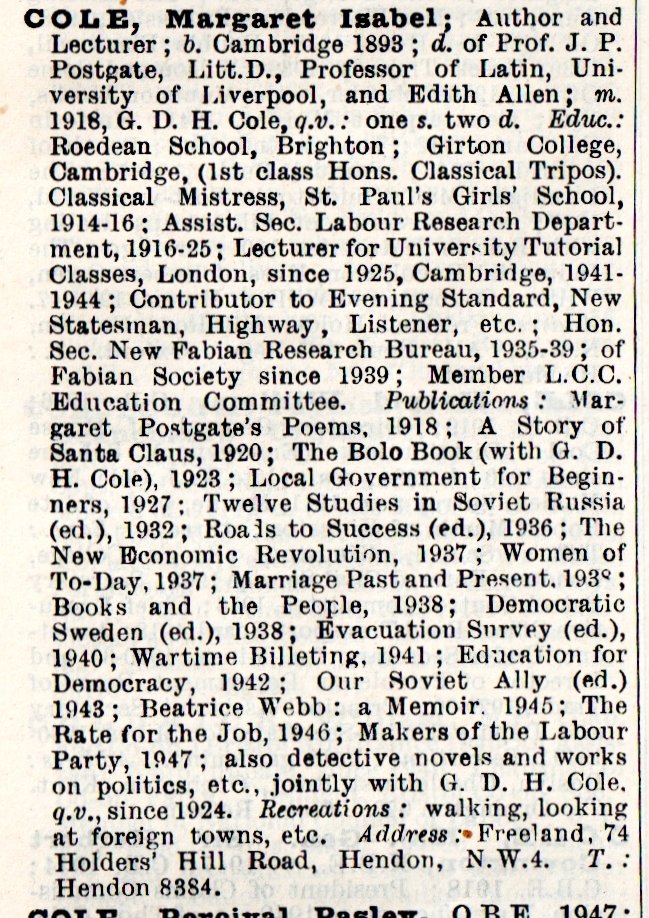 look at her qualifications and consider what knowledge she really had of then-modern science and industry, and then-modern finance, and then-modern law. And war.
Hampstead was an ideal location: high, the elevation being a discouragement to jerry builders, as horses found it difficult. But it had an underground station (1907) on the northern line, and ruralish surroundings: the Vale of Health was renamed from Hatchett's Bottom in 18-something. The Heath was and still is huge. Hampstead Garden Suburb (from 1907?) owed its existence to the Garden City movement. The Hammonds (John and Barbara Hammond, 1872-1949 and 1873-1961) on labourers were an earlier version. Henry Mayhew (1812–1887) was an earlier example, probably more genuine, original and less study-bound.
Here's Dame Margaret (pp 195-6): 'The work of the N.F.R.B. [some 'Bureau'] committee ... all undertaken with the long-term purpose of influencing public opinion ... in the direction of finding radical solutions to the problems of the troubled world, did not bear effective fruit until after the coming war [WW2] ... [Cole's first work was] the writing of large books of popular information.
The new line of country was made possible by the enterprise of Victor Gollancz ... who had not long before resigned the managing directorship of Ernest Benn's [publishing] firm in order to start his own publishing business. [Before] the Left Book Club ... he and Douglas agreed on the imperative need to provide information—plenty of it—in popular language ... Victor smelt the potential market; Douglas was ready to supply the goods for display on the stalls. the first fruit .. in 1922 ... was called The Intelligent Man's Guide Through World Chaos ... and this, for the time, bold venture in pricing [i.e. cheap] paid off handsomely. ...' Note that Dame Margaret seems innumerate about publishing; print-runs, printing-costs, and whether Gollancz was subsidised, as seems almost certain, are not part of her mental equipment.
Somewhere is a passage on an (((American))) trust or charity or academic philanthropic outfit offering six hundred pounds per book for some series. Dame Margaret does not reflect that the same outfit no doubt offered much the same to obscure authors in France, Germany, Italy, Spain, and Poland, Lithuania etc. She reminds me of Freemasons—not the 33rd level, which for example Buzz Aldrin and other US frauds belonged in, but the inferior ranks, enlivened by the thought of money and some contacts, but completely innocent of suspicions as to Freemasonic ultimate purposes.
The book is of interest only for its presentations of Jewish encroachments into Britain. The New Statesman, Harold Laski, Lord Nathan of Churt, Crypto-Jews, undeclared Jews, probable Jews, Reformed Jews, Jews from Germany, Jews from Poland, Jews from Russia, Jews from Hispanic parts, Crypto-Jew journalists, crypto-Jew academics, teachers, journalists.
Were the Coles Jews? I'll leave it to others to try to check; they both seemed naïve, and for example had to leave their Hampstead House, called 'Freeland', when their income declined. G D H Coles' personal interests seemed non-Jewish—scattered and accrued for trivial personal reasons. She seemed to have little historical feeling; no idea about the Federal Reserve, no idea about Jewish networking, no feel for the horrors of Jews in their taken-over empire in Russia and its environs; no idea about either world war; no views on things like the 'United Nations'. Bewildered with 'nuclear weapons'. No idea why the 'Left Book Club' was closed in 1948, a few years after the war, when of course the last thing the Rothschilds et al wanted was serious left enquiry.
As with religious believers in fairly established times, it's impossible to be sure that beliefs in outlying areas aren't simply adopted because they paid. It's likely enough.
© RW 16 May 2020
[ Top of page ]
UNWIN including ALLEN AND UNWIN
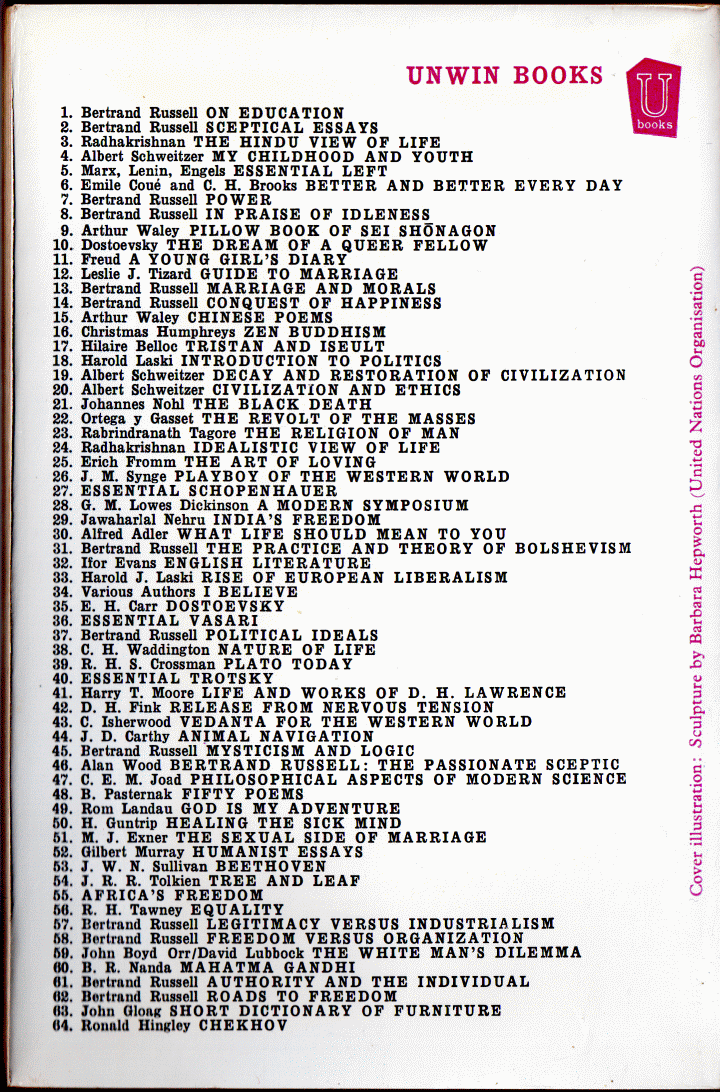
[Large image chosen to allow titles to be readable] Back cover of 1965 paperback edition of the book Authority and the Individual, first published in 1949, containing The Reith Lectures for 1948-9.
'Stanley Unwin' (1884-1968. I leave it to others to investigate his real name and background) was used as a figurehead of publishing on Britain: President of the Publishers' Association, 'knighted' in 1972 by the highly intellectual Queen Elizabeth. He's sometimes described as a lifelong pacifist, which you are free to believe if you want to. George Allen & Unwin is reported to have been established on the day the Great War was established. Russell's Autobiography states that Unwin approached him in late 1915, proposing to publish Principles of Social Reconstruction, regarded by Prof. J H Muirhead as a reworking of Godwin. It looks to me that the publishing firm was set up—I'd guess with Jewish Fed money—to produce Jewish propaganda along the lines of Watts (see below), with an absolute avoidance of mention of Jews, but every item slanted toward what Jews collectively decided.
Looking at the list, we see a title by Belloc, but not The Jews; a title by Laski, who of course was a Jew liar and apologist; quotations from Marx, Lenin, and Engels, and from Trotsky, hiding the Jewish connections; Erich Fromm's Jewish attempts at psychology; Joad, plagiarist philosopher. A few titles on India and Africa. Many books, including the above, as misdirection (on Chekhov, Dostoevsky, Pasternak Poems) and fillers or irreleventsia (Chinese Poems, Animal Navigation, Furniture, Plato, Blind White Fish in Persia...)
[ Top of page ]
[ Top of page ]
WATTS'S THINKER'S LIBRARY (1929-1951) —part of the Rationalist Press
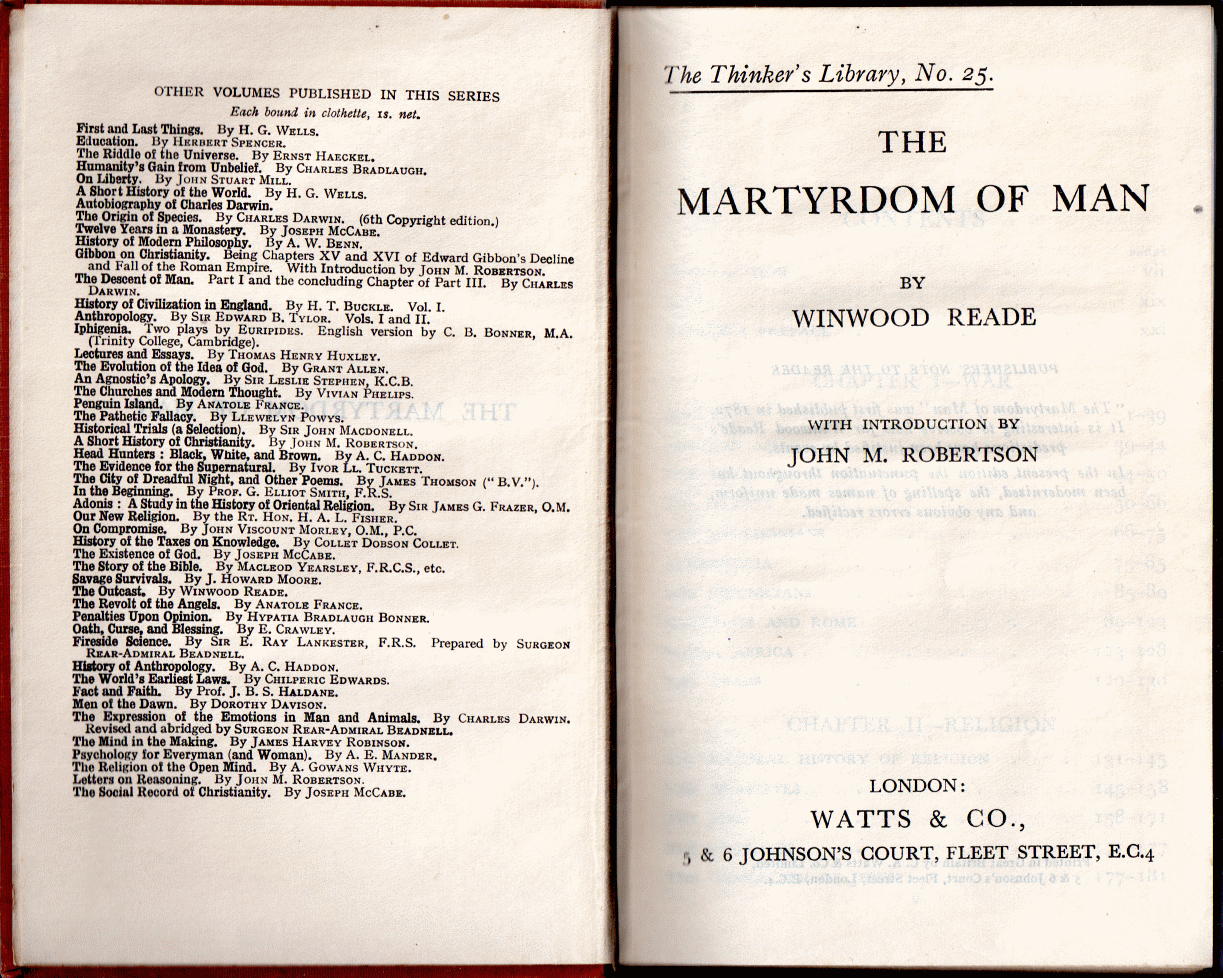
[Large image chosen to allow titles to be readable]
There's some fascination in detecting Jews at work. It's analogous to detective work, teasing out opportunities, attitudes, and secrets, while bearing in mind the everyday world of money, credit, copyright. Here are some few suggestions; no doubt there are special Jewish fantasies I haven't included, in view of the secrecy surrounding them. I've pointed out what's been selected, but also what hasn't.
- Christianity, Churches, Monasteries etc. These of course are a target for Jews, but with careful omission of any suggestion that Jews collaborated with Christianity, as of course they did. Joseph McCabe was first-class on this, with detailed knowledge of Roman Catholicism (not Greek, or Russian Orthodoxy) and utterly Jew-naive. We have a bit of Gibbon. There are related topics—rationalism (originally this was aimed only against belief in miracles), open mindedness, agnosticism, J B S Haldane, a naive 'Marxist' on faith. There is absolutely nothing on the Talmud, and nothing much on the Old Testament.
- Early man, anthropology, savages, head hunting etc. The point may be to suggest a transition from 'man' as 'infants', to something modern and better. There is scope for anthropologists and for H G Wells's Short History of the World. Jewish attitudes—using inferior races, for example in the slave trade, and 'white niggers' in the USSR; Jewish hopes for race-mixing, which has increased as transport techniques have improved; the Jewish attitude of simple extermination of rivals such as Hindus and Armenians; the emerging Jewish attitude of telling lies—the 'Holohoax' being (after Internet) well-established; others, such as pretending Jews were not involved in the Armenian genocide (or even more outrageously, helped Armenians) and post-1945 genocides, and in Arabia and China, are generally censored.
- History is generally something like a set of cheerful and vague guidebooks. Buckle is a perfect example; so is The Martyrdom of Man (title page shown here). Victorian optimism, not backed up by information, is the the thing. Events such as the Moslem destruction of much of India are omitted. So of course is the truth about the Great War—no mention of the Federal Reserve in the USA, or the truth about trench warfare.
- Psychology doesn't form much of their book list. Obviously the like Freud's Jewish rubbish. But scope for Jewish interests in child sex, prostitution, and perversions do not sit well with a library for thinkers. It's clear they don't like self-improvement or advisory books for their British readership. There's nothing on exams, degrees, studies.
- Science isn't represented much, either. Too few Jews, unless they can ease Einstein in. Nothing on techniques, likely effects. Lankester provides amiable light reading, though.
- Laws include historical trials and blasphemy laws, generally picked for Jewish reasons. Another topic is of the 'earliest laws' type; presumably because the Jewish view of 'law' is a caste of fanatics ruling goyim. 'Laws' are assumed to be good.
[ Top of page ]
NOTES ON PENGUIN SPECIALS
[ Top of page ]
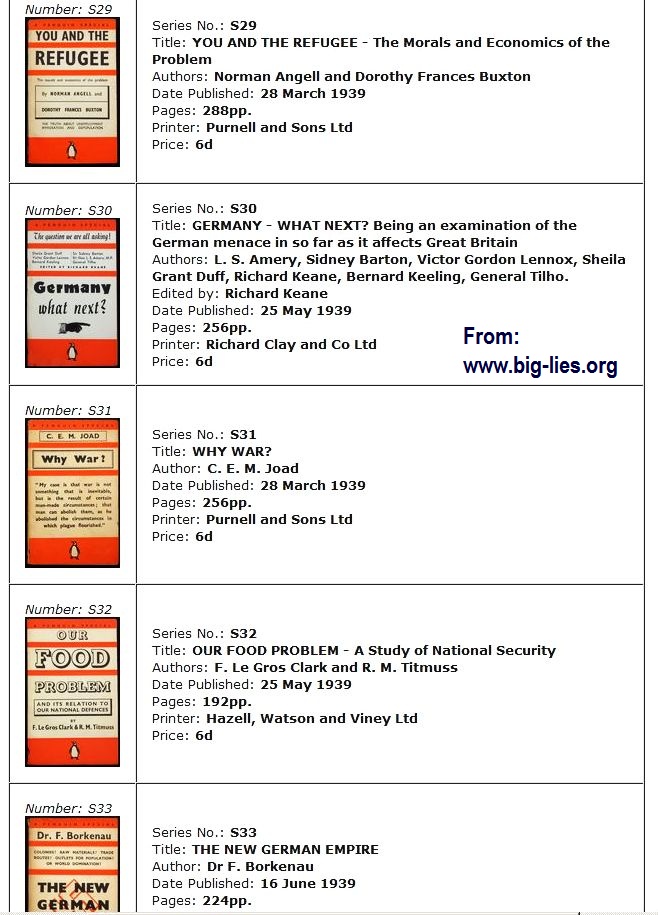
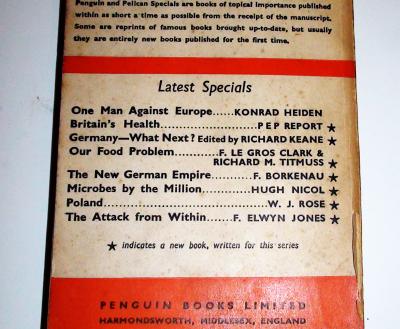 PENGUIN SPECIALS at the end of 1938. Picture (left) shows the back cover of Angell's THE GREAT ILLUSION - NOW, itself a Penguin Special. All these books were published by Penguin. Note that one book in the series—on Palestine—was cancelled. It's easy to guess reasons for this. Here's a rough guide to these eight titles.
• One Man Against Europe .. Konrad Heiden
PENGUIN SPECIALS at the end of 1938. Picture (left) shows the back cover of Angell's THE GREAT ILLUSION - NOW, itself a Penguin Special. All these books were published by Penguin. Note that one book in the series—on Palestine—was cancelled. It's easy to guess reasons for this. Here's a rough guide to these eight titles.
• One Man Against Europe .. Konrad Heiden [Heiden is described on Wiki as 'an influential Jewish journalist and historian of the Weimar Republic and Nazi eras'. The title is obviously intended to suggested Hitler was alone, and to deny his immense popularity. My notes on his 1944 book on Hitler's Rise to Power was of course designed to hide Jewish activities: 'Jew Bolsheviks', Bela Kun of Hungary as a Jew, emigration e.g. to the USA, Nazi policies aren't indexed and are oddly underplayed. There is the traditional reticence about money (and also about Jewish censuses, though the author isn't averse to massive use of statistics in other contexts - see 513ff. Japan gets a few mentions with nothing that I could see on trade restrictions as a cause of war. It's unlikely Heiden was anything more than a hack, in the same tradition as Martin Gilbert.]
• Britain's Health .. P E P REPORT ['Political and Economic Planning'. I haven't made much attempt to check on this pre-WW2 QUANGO. The obvious interpretation is that it's a Jewish-funded outfit to be used in Jewish control of Britain and its resources. Obviously it would have had to have been written to offer inducements for when the coming war is over.]
• Germany - What Next? Edited by Richard Keane [Being an examination of the German menace in so far as it affects Great Britain. Authors: L. S. Amery, Sidney Barton, Victor Gordon Lennox, Sheila Grant Duff, Richard Keane, Bernard Keeling, General Tilho. No problem identifying the motivation here. And no problem identifying why Hitler's peace offers were unmentioned. Leo Amery was literally a crypto-Jew: he kept it secret, including his involvement with Balfour. Most of the others were Jews or Jew-connected.]
•
Our Food Problem - F. Le Gros Clark & Richard M. Titmuss [Foot shortage may have been another red-herring meme. Jews wanted control of food, by way of control of money. Here's Jensen on the 'World Food Shortage'  .]
• The New German Empire .. F. Borkenau ['Borkenau was born in Vienna, Austria, the son of a civil servant. As a university student in Leipzig, his main interests were Marxism and psychoanalysis' is a typical description. In fact he attended the Frankfurt School. He wrote 'The Communist International' (1938), 'a history which is also an analysis'. Obviously such a creature would never write an honest appraisal of Germany.]
• Microbes by the Million .. Hugh Nicol [Hugh Nicol '... outlines a new philosophy of science ..' I'd guess the point here is to have expensive research institutes. Certainly this worked with Jews and the huge fraud of nuclear weapons, but the principle would be control. Biological warfare would be part of the work.]
• Poland .. W. J. Rose [This seems to be William John Rose. I haven't seen this book (emails are welcome) but probably the author was yet another Jew. The book might cast light on official policy to Poland: Jews presumably wanted it to attack Germany, and hence Jews in Poland provoking Germany. And they would want bogus assurances from the British government. I'd guess this book was never reprinted, or heavily edited, after Stalin's Jewish controllers invaded Poland.]
• The Attack from Within .. F. Elwyn Jones [Frederick Elwyn Jones, who at the time was a 30-year old barrister 'with experience of living in Germany', writes of 'German expansion and preparations for world domination, and the need for this expansion and the evils of Nazism to be stopped'. The last authorities he gives for the evidence he submits (he used Hansard, The Daily Telegraph and The Manchester Guardian a lot) are dated late May 1939. Just another rented prostitute, indifferent to millions of deaths.]
The right-hand picture is taken from an Internet list of all the many Penguin Special titles. Note the publication date is given, down to the day. And the printers are quoted: presumably they had no option but to print propaganda, or Jewish clients would in future be closed to them. It's worth quoting a bit from H G Wells  , on the Penguin Special ' The Jewish Problem' by Louis Golding which ignores completely 'the effect of this Chosen People cult upon the outside world'.
[ Top of page ]
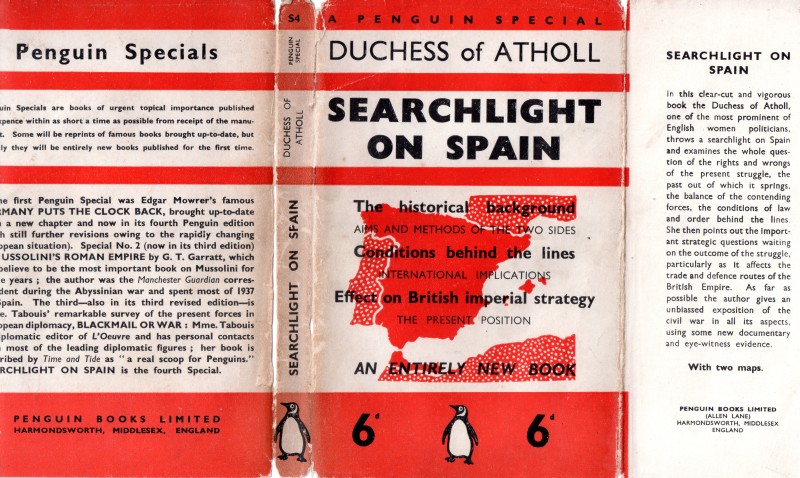
Penguin Special S4: The Duchess of Atholl on Spain. Katharine Marjory Ramsay spent about six months up to May 1938 writing her book, apparently with input from about half a dozen people. The 'Spanish Civil War' at the time was viewed as an extremely serious event. To this day, Jewish Hollywood-ish films take the Jewish side. ('Dancing at Lughnasa', 'Land and Freedom', 'Pan's Labyrinth', for example). Because of Jewish censorship, views on this war vary absurdly. Hugh Trevor-Roper/Lord Dacre thought it closely resembled the Vietnam War, for example. It's possible atrocities by the Jewish side will be exposed as, or if, archives are opened. Bear this in mind. Note that e.g. David Irving spent time in Spain after 1945, and there may well be links with Spain.
More on Searchlight on Spain written about 7 years later.  [ Top of page ]
[ Top of page ]
Penguin Special S1 was 'Germany Puts the Clock Back' by Edgar Mowrer; S2 'Mussolini's Roman Empire' by G T Garratt; S3 'Blackmail or War' by Mme Tabouis. S4 was 'Searchlight on Spain'. This book has atrocity stories, including some against Catholics. Guernika (two spellings) is mentioned. I don't think this book has much value, as Ramsay seems to have no way to check on lies, which of course were a staple of U.S.S.R. Jews. However, the point of course was to support Jews in Spain by war. This would make money for Jews through weapons, through control of Spain's currency, and control of credit. The truth, as is traditional with Jewish parasitism, is as irrelevant as trying to persuade a guinea worm not to live under the skin.
[ Top of page ]
|
|
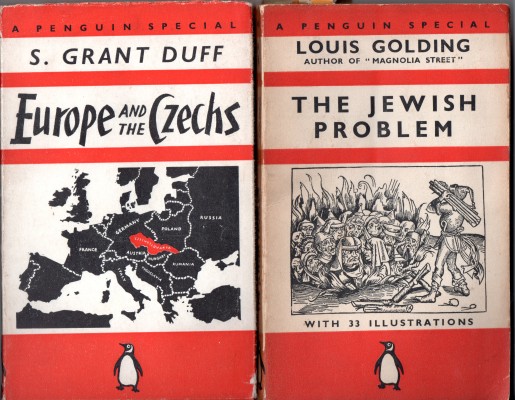
Penguin Specials S9 on Czechoslovakia (left). Czechoslovakia was, like Spain, a temporary focus of attention, and naturally needed its dose of dissimulation in pursuit of war.
And S10 Golding on Jews  (the link is some contemporary comment by H G Wells). (the link is some contemporary comment by H G Wells).
[ Top of page ]
'World Affairs' Penguin book of 1945, by James Parkes (b. 1896), who may have studied classics and theology at Oxford (it's unclear) after 'serving' in the Great War. The blurb states he 'worked in different student organizations' (no doubt Jewish), and in 1935 'the official Nazi antisemitic organization'—the Antisemitische Weltdienst—tried to murder him.' He made a career of lies, probably unable to dismount the tiger, and escaping a joke career in the Church of England. Southampton University has some of his papers.
|
|
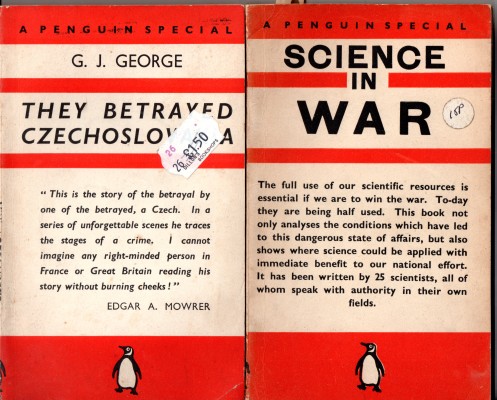
Penguin Specials S24 (left, Nov 1938) on Czechoslovakia and S74 Science in War (right, 1940). Science in War, published after the British declared war on Germany, but the USA hadn't yet entered, is an odd book, supposedly written by 25 anonymous scientists, possibly intended as a smoothing agent to pretend wars aren't that bad. Or possibly to help reinforce the declaration by simply taking war for granted. Chapters are: Some Things Science has Done/ Science in the Conduct of War/ The Wounded/ Food/ The Background of Industry/ Persuasion and Efficiency. One of the fears at the time was aerial bombing; another was poison gas; another was starvation; and a few people wondered how to pay for it. I think it's fair to say this book was to keep the plebs reassured.
[ Top of page ]
|
|
[ Top of page ]
Victor Gollancz and earlier members of Gollancz families
RW 20 May 2020.
I've put here three descriptions from reference-books of Victor Gollancz, Hermann Gollancz (1852-1930) and Israel Gollancz (1864-1930). These two latter were largely at London University, which appears to have been established as a more-or-less Jewish educational establishment as opposing where necessary the supposedly Reformation Christianity of Oxbridge.
Hermann Gollancz is described as an 'authority on Hebrew language and literature'; readers might guess at how much he was concerned to publicise the Talmud.
Israel Gollancz was supposed to be 'an authority on early English texts'. Revisionist students might investigate the extent to which 'British' deeds, for example in India, China, and South Africa, were obscured by Jews.
Here's some commentary by Hilaire Belloc, more or less contemporary, who wrote on the Jews before the 'Great War' and the Federal Reserve, and after— The Jews was published first in 1922, a few years after the end of that war. Here are a few extracts:
... treating of the Jew ... [as] a plain citizen like the rest, worked well enough for a time. One might almost say that there was no Jewish problem consciously present to the mind of the average educated Englishman or Frenchman, Italian, or even western German, between, say, the years 1830 and 1890. A very small body of Jews ... were vaguely associated with wealth ...; a large proportion of them were distinguished for public work ... The presence of such men could not conceivably lead to political difficulties—or at least, so it then seemed.
It might have continued to flourish for yet another generation ... but for two new developments ... The first was the growth of numbers, the second of influence. ... the enormous increase throughout all the West of the Jewish poor, accompanied by the enormous increase of the power exercised by the Jewish rich in public affairs. ... their presence was everywhere unavoidable, in the streets, and in the offices of government. The fiction ... became impossible in the face of the vast new ghettoes of London, Manchester, Bradford, Glasgow, [and Leeds] and the formidable and growing list of Jewish and half-Jewish Ministers, Viceroys, ambassadors, dictators of policy.
Belloc did not understand propaganda. He wrote: ‘the press of our great cities is controlled by very few men, whose object is ... the piling up of private fortune.’ In fact, the new industrialised press made it possible for Jews to secretly propagandise on huge issues: in particular for wars against people they thought of as enemies: these included all non-Jewish Europeans and Americans.
Belloc appreciated the vulgarity of newspapers, but understated the extent of academic corruption (and bureaucratic and legal corruption, which he barely mentions). Here he is on historians (with whom he must have had a lot of experience; his degree was in history, which he did when relatively mature):
The same man who shall have written a monograph upon some point of nineteenth century history and left his readers in ignorance of the Jewish elements in the story will regale you in private with a dozen anecdotes: such-and-such a man was a Jew; such-and-such a man was half a Jew; another was controlled in his policy by a Jewish mistress; the go-between in such-and-such a negotiation was a Jew; the Jewish blood in such-and-such a family came in thus and thus—And so forth: but not a word of it on the printed page!
And Belloc did not realise the extent of Jewish power; he knew about raw materials and mining, but not financing large-scale weaponry and materiel.
... hundreds of educated men taken into the temporary Civil service during the late war ... found, holding the locked gate of one monopoly after another, the international Jew. ... everybody has discovered ... what is ... a source of exasperation—the solidarity of the Jewish race where the interests of any member of it were concerned.
Belloc never understood the Jewish genesis of Catholicism. He accepted the mythology of belief systems as he cause of religions; he had little feeling for violence and property as the true motives. And Belloc didn't realise the importance for Jews of destroying historical evidence; Belloc thought it was natural that European man should have little connection with his past, and Belloc didn't see that this was partly accomplished by getting rid of evidences, such as writings, laws, chronologies, historical accounts, evidence of money. This attitude is part of the true tradition of Catholicism. Here's Belloc, assuming men are too limited to think in long-terms ways:
... we are asked to believe that this political upheaval was part of one highly-organized plot centuries old, the agents of which were millions of human beings all pledged to the destruction of our society and acting in complete discipline under a few leaders superhumanly wise! The thing is nonsense on the face of it. Men have no capacity for acting in this fashion. They are far too limited, far too diverse. ... the conception of a vast age-long plot ... will not hold water, any more than will the corresponding hallucination which led men to believe that the French revolution (a thing utterly different in kind from the Russian) was the mere outward expression of a strictly disciplined secret body. In the case of the French Revolution everything was put down [according to Belloc!] ... to the secret agency of The Order of Templars acting unweariedly through six centuries, and finally bringing down the French monarchy. In the case, of course, of the Bolshevist anarchy a still longer range is given to the final result: for "Templars" read "Jews," and for "600" read "2,000" years. It is all smoke.
Two Gollancz brothers in about 1930. Victor Gollancz was not included.
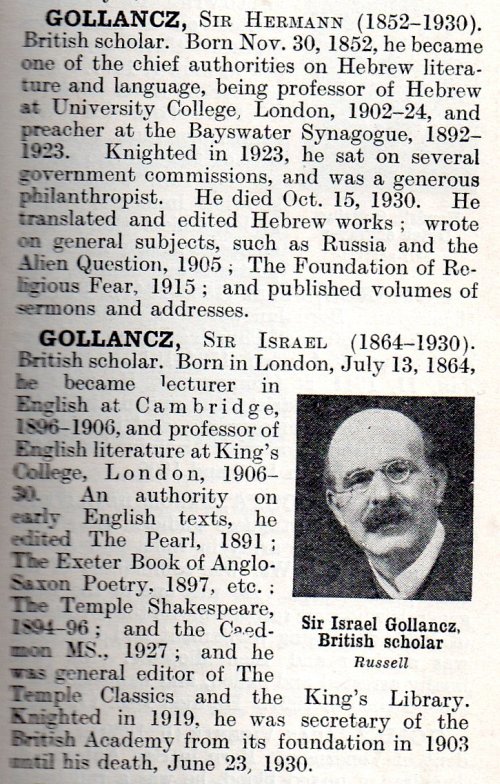 |
All three Gollanczes. Note the English education, the secrecy about what he actually did, the description as a 'philanthropist', and of course the numerous Jew frauds.
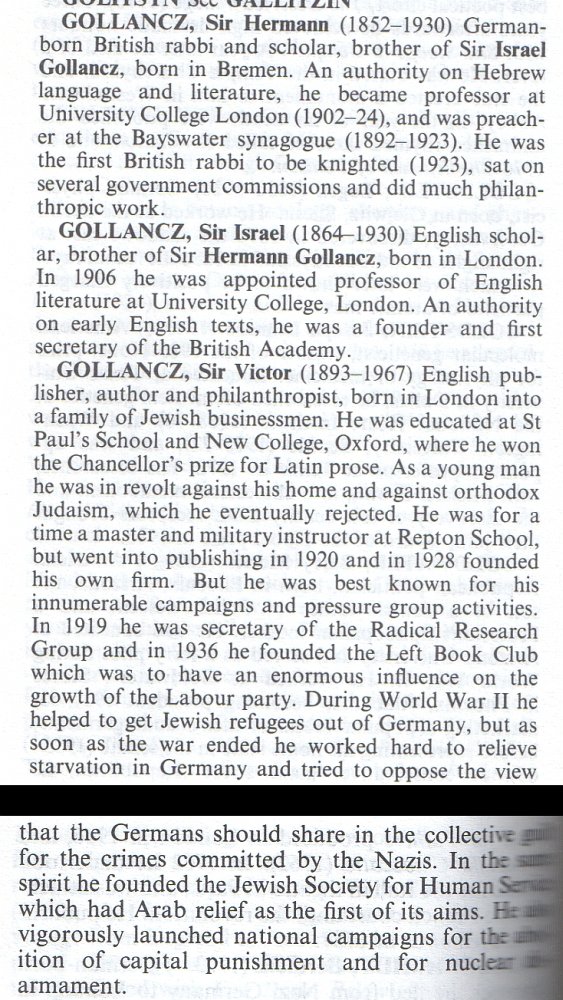
|
'Who's Who' in 1948, after the 'Left Book Club'. Connoisseurs of Jewish nonsense can identify push for war, lies about Japan, lies about Germany, lies about Jews, lies about the Labour membership, lies about the Jewish nuclear frauds.
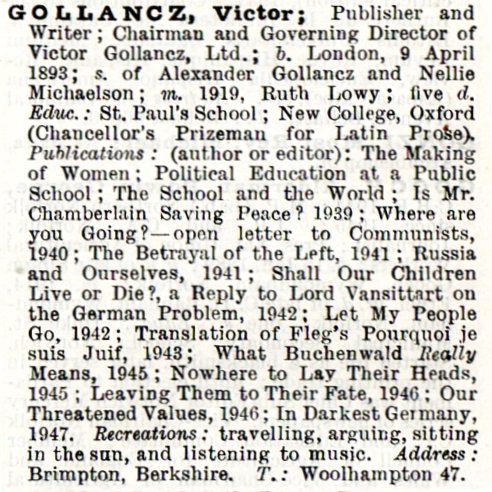
|
C N PARKINSON ON THE LEFT BOOK CLUB
[ Top of page ]
[Here's more by Parkinson; well-written, but Jew blind: Parkinson on Marx, and on the Webbs]
Appendix from Left Luggage (1967). Pagination from the paperback edition. C N Parkinson, famous for Parkinson's Law, wrote 'Left Luggage' as a rather unfocused anti-'left' analysis and protest. As anyone can see from the following appendix, Parkinson had no real idea of the part played by Jews in Britain's history and downfall. He had no idea of the start of the Second World War. For example, he describes Victor Gollancz as a 'humanitarian Jew'–something like the opposite of the truth. Parkinson had little idea about the subversion of socialism by Jews—though his book includes quite acute material on Beatrice and Sidney 'Webb'. He had no idea about Jewish control of money, and with infinite naivete assumes that Gollancz's books were subject to the normal problems of costs that apply to non-Jewish businesses. No doubt Gollancz was subsidised; and no doubt when their usefulness was over, after 1947, 'Left Books' were discreetly dropped.
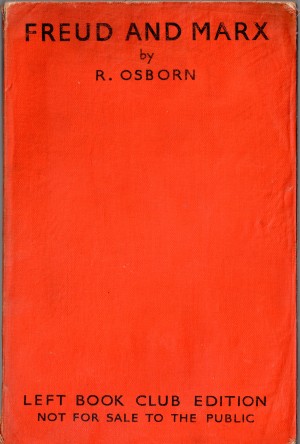
The intellectual life of the British Labour Party is fairly represented by the story of the Left Book Club. This was founded by Victor Gollancz in 1936 and reached its maximum membership of 60,000 in the following year. Some sixteen hundred discussion groups were organized and there was even a rally in the Albert Hall. Victor Gollancz (1893-1967) was a humanitarian Jew of great energy who had been managing director of Benn's, the publishing house which pioneered the sixpenny paperback. He founded his own firm in 1928 and had an immediate success with Journey's End by R. C. Sherriff. [Note: this was a lachrymose and sentimental look at deaths in the First World War trenches; a similar book was Neville Shute's On the Beach dealing with a hypothetical 'nuclear war'.] His aim in founding the Left Book Club was to make a synthesis of socialist ideas, create a Popular Front and 'stop Hitler without war'. Books published for the Club numbered about 247 in all, the first, Out of the Night, appearing in 1936 and the last in 1948. The volumes were accompanied and explained in a monthly periodical called Left News which flourished over the same period. Authors who contributed to the series included Sir Richard Acland, Clement Attlee, Emile Burns, A. Fenner Brockway, G. D. H. and M. I. Cole, Sir Stafford Cripps, Victor Gollancz himself, J. B. S. Haldane, Harold Laski, Philip Noel-Baker, George Orwell, R. Palme Dutt, Stephen Spender, S. Swingler and R. H. Tawney. The books published were mainly concerned with immediate events and have had little circulation in later years. George Orwell's book, The Road to Wigan Pier (1937), is perhaps the only Left Book Club work to be classed as a work of literature. The most prolific author in this series was John Strachey, with seven titles, next to him G. D. H. Cole with six and Victor Gollancz himself with four.
Faithfully reflecting the mood of the period, the Left Book {185} Club publications are weakest in political theory. Readers were assumed (no doubt rightly) to be members of the Labour Party, loyal to the Webbs and needing no argument to sustain their faith. Socialist theory was thus represented by An Outline of Political Thought (1939) by S. Swingler, The Acquisitive Society (1937) by R. H. Tawney, and three works by John Strachey, Theory and Practice of Socialism (1936), Federalism or Socialism? (1940) and Programme for Progress (1940). After F. Allen had asked Can Capitalism Last? (1938) and after Stephen Spender had sounded the call Forward from Liberalism (1937), the socialist message came to an end. That, however, was where the Marxists began, for six of the publications deal with Marxism; one by Emile Burns, one by G. D. H. Cole and a third comparing Marx with Freud. Fourteen volumes in the series deal with Soviet Russia and another six with China, these last including Red Star over China (1937) by Edgar Snow and The Chinese Communists (1946) by Stuart Golder. One way and another, the Communist point of view is fully represented, finding some further expression in another seven books about the Spanish Civil War. But the Popular Front was to include the workers as well as the Communists. There are thus several books about Trade Unionism and one on the Co-operative Movement. More emphasis is given, however, to particular grievances, as Six Men of Dorset (1937) or to studies in the problems of unemployment. Most significant of these was Ellen Wilkinson's book about Jarrow, The Town That Was Murdered (1939). [Note added later: the 'Jarrow March' was a typical bit of Jew propaganda. In fact, there was little interest within Jarrow, and few people participated, I'm informed by inhabitants of the town, which was conveniently remote from London.] More telling still, however, were some of the attacks on Conservatism such as that implied in Tory M.P. (1939) by Simon Haxey. For the workers, again, there were included about twenty merely educational books, their subject matter ranging from eugenics to birth control, from chemistry to economic botany. For relaxation, finally, there were Poems of Freedom (1938) and the Left Song Book (1938).
Less fortunate was the campaign to 'stop Hitler without war'. Books on foreign countries and foreign policy form, it is true, the most numerous section in the list. Countries {186} discussed include Austria, Czechoslovakia, Denmark, France, Greece, Eire and Poland. The country least mentioned is the U.S.A. Books denouncing the Nazi and Fascist movements number about twenty and include such titles as Hitler the Pawn (1936) by Rudolf Olden and Under the Axe of Fascism (1936) by Gaetano Salvemini. Denunciations came most loudly, however, from avowed pacifists whom any dictator could safely ignore. Book titles range from Battle for Peace (1938) by F. Elwyn Jones to Struggle for Peace (1936) by Sir Stafford Cripps. Victor Gollancz himself asked Is Mr Chamberlain Saving the Peace? (1939) and Leonard Woolf complained of Barbarians at the Gate (1939). The note of pessimism in Why Capitalism Means War (1938) by H. N. Brailsford was answered confidently by Eleanor Rathbone whose conclusion was that War Can Be Averted (1938). All this drivel was definitely harmful to British interests as well as to the cause (for what it was worth) of peace. An odd sequel was the Left Book Club contribution to civil defence; A.R.P. (1938) by J. B. S. Haldane, Protection of the Public from Aerial Attack (1937) by a group of Cambridge scientists, and How to be Safe from Air Raids (1938) by J. B. S. Haldane again. These publications reveal the general attitude of the Left towards international affairs. First, the country should disarm in the cause of peace, reducing the armed forces to a minimum and undermining the morale of the troops by assuring them that wars are caused by capitalists and arms manufacturers. Second, we should proclaim our undying opposition to the Nazi and Fascist movements in Germany and Italy. Third, we should interfere in the Spanish Civil War, supporting the 'government' against 'the rebels'. Fourth, we should strive above all For Peace and Friendship (1937) and, fifth, we should concentrate our main effort not on winning the coming war but on saving the civilian population from air attack. This was the road to Munich, if not to Wigan Pier.
Towards the Commonwealth the attitude of the Left was indicated, first of all, by Alexander Campbell's book, It's Your Empire (1945). A certain responsibility was thus {187} assumed but the books on this topic reveal a lack of interest. Empire or Democracy by L. Barnes (1939) defines an alternative and Subject India (1943) by H. N. Brailsford suggests an attitude. Two other books about India with Left Turn Canada (1946) by M. J. Coldwell, and When Smuts Goes (1948) by Arthur Keppel-Jones, go to complete the Left Book Club's survey of the Dominions. The colonies are dealt with in one general work, Colour, Race and Empire (1944) by A. G. Russell and two books about Africa; one of them, by John Burgen, entitled Black Man's Burden (1943). Little interest was shown in Australia or New Zealand, in Malaya or the West Indies, and practically none in the Middle East except as illustrating the Jewish Question.
Left Book Club publications were priced at 2s. 6d. each, implying a fairly large circulation. Membership remained sufficient, however, during World War II and up to the time of the General Election of 1945. With Labour in power, membership dwindled rapidly and stood at just over 3,000 when the Club's activities were brought to an end in 1948. The last volumes incurred a considerable loss and Victor Gollancz went on to campaign in other directions. What is particularly interesting about this story is the fact that the Left Book Club provided only the literature of criticism and revolt. The basic ideas dated from before World War I and each current problem was seen in the light of an accepted creed. Books in this series had a limited range of mythology and grievance, exhortation and attack. Without a Conservative government, the whole movement died away. It might, of course, be argued that the Club, by 1945, had served its purpose. This was true in a negative sense but the formation of a Labour government should in theory have led to an outburst of creative thinking. Labour's Plan for Plenty by Michael Young came in 1947 and the electoral triumph of 1945 should have heralded a spate of even more constructive proposals. The energies which had been absorbed in warfare were free now to build Jerusalem in Britain's green and pleasant land. Intellectually, however, the Labour Party had long since shot its bolt. [Note by rerevisionist: In fact, the Jews who funded the Labour Party had no interest in the white British. No 'constructive proposals' or 'creative thinking' for them!] The Left Book Club series tailed {188} away with duller books and fewer readers. Even a further and prolonged period in opposition failed to revive the Club, which is now no more than a memory.
If Out of the Night (1936) by H. J. Muller marked the beginning of this series, we can see an equal significance in the titles with which it came to an end, namely Prisoners of Fear (May 1948), How Long the Night (August 1948) and, last of all, The Meaning of Marxism (November 1948).
[ Top of page ]
[ Top of page ]
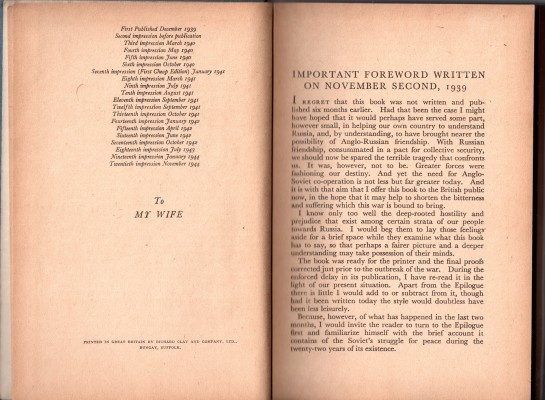
Victor Gollancz ('VG'): The Socialist Sixth of World by the Dean of Canterbury, Rev Hewlett Johnson, published first in December 1939. As the printing details show, it was still on sale in 1944. The list of acknowledgements makes it fairly clear he assembled his book from about fifty books in English, the 'London Library of the Society of Cultural Relations with the U.S.S.R., and chiefly Mr A T D'Eye of Balliol on 'economics, political theory, constitutional history and practice in general'. Johnson was well-known at the time for his gullibility. It's entirely possible that the Church of England would have had financial difficulties if they had not supported a few Stalin supporters. And of course Oxford University.
Johnson also wrote Soviet Success, a post-war book, in which he recounts meetings and travels in the USSR, meetings including Stalin and Molotov. It's interesting to see the start of 'Holocaust' fraud. I could find nothing about nuclear science; Johnson had a science degree; maybe he was kept away. His books say almost nothing about finance, of course. This book was published by Hutchinson; probably the days of drumming up support for the Jewish paradise of the U.S.S.R. were no longer needed.
The general rule with these books is to judge commentators by their attitude to Jews. If you don't realise this, you'll be puzzled by emphatic claims that A is good, but B is bad, irrespective of any evidence. For example, Bertrand Russell praised Jews, until very late in life when he nosed about in US war crimes, and Israel's expansion: therefore Russell early on good, later on bad. Or Arthur Koestler: he wrote slightly unflattering things about Bolsheviks, and later in life wrote about the Khazars: therefore, Koestler bad. Or H G Wells who said some unflattering things, such as the Jewish tribal racism was a 'bad tradition'. Therefore, Wells OK early on, bad later. C P Snow said very little about Jews. Therefore, Jews say very little about C P Snow. When it comes to actual criticism, the important issues are Jewish money control, and also the innumerable frauds that Jews have practised. Obviously Gollancz would never publish such books, and it's likely any printer would be persuaded not to print them, if he didn't want to lose money from lost contracts for endless Jewish junk publishing.
Johnson illustrates one of the unremarked downsides of Jewish hidden influence is the low grade of the functionaries carrying out their work. Think of US presidents, EU officials, media hacks, talking heads posing as scientists, third-rate academics...
[ Top of page ]
|
|
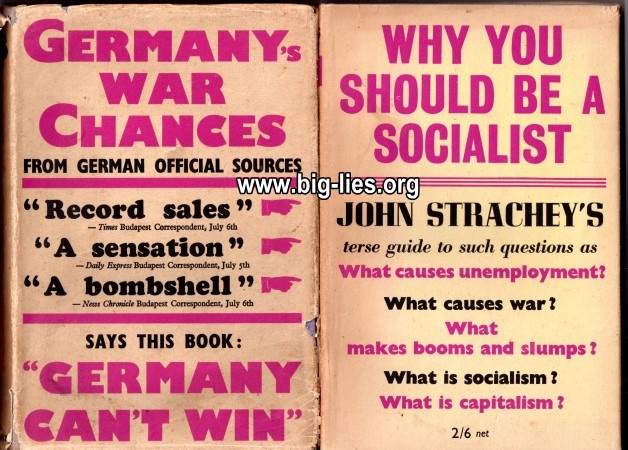
Victor Gollancz ('VG'): the 1939 book (left) has "Nazis Can't Win" on the spine: the Jewish-coined slang, still with us, is not repeated on the front, in keeping with the coining of the slang by "Jewzis". Dr Ivan Lajos, an assistant professor in Hungary, wrote this book, obviously aimed at Hungarians. It mostly lists things like oil, food, and armaments. Many books at the time has statistics of production of this and that, no doubt unreliable and no doubt hard to interpret: what meaning does 10 million tons of pig iron have? It's really quite odd that a not very good book by a not very informed source should even be thought to contribute towards a serious case for war. The incredibly trivial attitude of Jews to the deaths of other armies has to be understood. If you die, they don't care, or even notice.
Strachey's Why You Should be a Socialist (1944), a thin volume (right), asks on the cover What causes unemployment? What causes war? What makes booms and slumps? What is socialism? What is capitalism? - and we can regard these questions as requiring Jewish misdirection. Unemployment comes first because it's complicated, and involves endless issues of rents, productivity, ownership and what have you, which Strachey of course fluffs over. But many wars are known to have been organised by Jews, and clearly that's not what's wanted! Similarly with depressions: Jewish control of money puts them in an ideal position to control and withdraw credit. They don't have to; but they do. Strachey will of course not mention that. 'Socialism' has to be described idealistically, as the truth about the U.S.S.R. was realised by Jews to be a bit unappealing. But capitalism is a good thing to blame, because of its divide and rule aspect. But note that 'capitalists' are not Jewish financiers or property speculators; they are often rather hapless people, often mortgaged and overdrafted, trying to run their businesses, and fair game therefore to Jewish propagandists.
At the present day, we have electronic media: Jewish-controlled TV news, films including propaganda, as is usual; in addition to Jewish 'news'. The effect is much the same as around the Second World War. If Jews in some secret grouping want a war, all their puppets promote that war.
[ Top of page ]
|
|
Another Gollancz book in my possession is Harold J. Laski's Faith, Reason and Civilisation - An Essay in Historical Analysis (1944, with a preface written in 1943 from a small English village, Little Bardfield). It is a typically dull book. A small point of interest is a mention of J M Robertson's History of Free Thought and Christianity as 'binding' men. Another small point is that he discussed matters with 'Mr and Mrs Sidney Webb', though Beatrice Webb was dead by the time this book was published, and Sidney Webb (or whatever his real name was) had been made 'Lord Passfield' more or less fifteen years earlier. The book leaves a strange impression: Laski has the Jewish outlook that Jews alone matter; and his book omits any possibility that the war then raging could be anything other than necessary and anything other than a struggle of immense heroism against huge odds. It is psychopathological. Its strength is that to uninformed people—and wartime censorship ensured that was very many people indeed—it sounds utterly convincing. There is no instinctive evolved defence against lies of this sort in any artificial medium; defence has to be learned. It is entirely possible that Jewish evolution over time has bred a collective tribe of pathological actors. I'll quote a few passages browsed from the book:
- '... as the summer passed into the autumn, and, in its turn, the autumn passed into the long winter nights in which, from dusk to day, the people endured a pitiless bombardment from the air, ... there was a reserve of strength in the British people which no disaster seemed able to exhaust. ...' [p 17. The fact the Churchill started bombing Germany, and continued until Hitler had to respond, is not mentioned by Laski. The 'pitiless bombardment' of course was far, far less than Germany endured. For that matter, 'pitiless' is exactly right to describe Jews in the USSR under Lenin and Stalin.]
- 'Lenin was surely right when the end he sought for was to build his heaven upon earth and to write the precepts of its faith into the inner fabric of a universal humanity. He was surely right, too, when he recognised that the prelude to peace is war ..' [p 200. Lenin was seeking heaven on earth. Ah, yes; I thought he was using Jewish money from the USA Fed to build slavery for Russian white niggers.]
- '.. the emergence of a type like Hitler is only a matter of time and the occasion. But Hitler is, after all, no more than the final term in a series in which the feudal lord, the nobleman of the Renaissance, the aloof Whig aristocrat of eighteenth-century England, the Prussian general..., the ruthless millionaire of that America which had not yet finished the exploitation of the frontier, were also terms; ...' [p 197. He's saying Hitler was an just another selfish exploiter, but the last one. It was important at the time to pretend Hitler was 'right wing'—it's one of the reasons for the slang expression 'Nazi', rather than 'National Socialist', to hide the socialism of Germany. The restrictive clause on American millionaires was no doubt to exclude Jewish financial millionaires, though obviously Laski would not say that!]
- 'All over the world, the youth of this generation stand at the gates of death. In their millions, they offer in the service of freedom a life that has hardly yet attained maturity. [p 9. At the gates of death is partly true: many 'fighters' of course were doing such things as packing parachutes, serving food, writing propaganda, and billeting evacuees. Britain and its empire. the USA, and the hapless Russians, not to mention Indias and Chinese, together made vastly larger numbers than Germany, but Laski says nothing about that. After all, Jewish money is at stake, obviously infinitely more important—literally—than lives of non-Jews.]
- 'In Germany, the most powerful socialist movement which, outside the Soviet Union, the world has so far seen collapsed with a completeness which was only surpassed by the humility with which the trade unions not only accepted destruction at the hands of their conqueror, but even watched him organise a war which meant their decisive annihilation with less spirit of defiance than their predecessors had shown in 1848...' [p 33. This is a reference to Rosa Luxemburg in Germany, and the 1848 events, both of course Jewish-controlled. I don't think Laski has the cheek to discuss Hungary and Bela Kuhn's disaster, although it was also what Laski calls 'socialist', i.e. 'Red' Jewish rule.]
- 'The events of the French Revolution take it [the 'common man's claim'] forward in a vast stride to a plane that a slave in Rome or a medieval serf would hardly have recognised.' [p 74. The 'French' Revolution and the resulting Napoleonic Wars were both Jewish promoted movements, as Laski is careful not to say. As was slavery of blacks, of course, outside the Muslim world. Laski often describes many people, such as trade union leaders, as 'bourgeois', quite an accurate description of Laski with his permanent salary and attractive housing.]
- 'No one who analyses honestly the Soviet experiment can look upon its acceptance of a proletarian dictatorship as a permanent feature of the effort they were making.' [p 170. It's difficult to know whether Laski could have been serious in his claim that proletarians were in control. Self-deception or instinctive lying? I think the latter is overwhelmingly more likely. If Laski really meant 'proletarians' controlled the USSR then he would have sided with them, supported them, and declaimed against Jews.]
- '... Mr Churchill came to see, between 1933 and 1939, [the periods when Jewish funding of Churchill started, after the Depression wiped Churchill out] that however 'cancerous' might be the 'Bolshevik growth', the performance upon it by Hitler of a surgical operation would be the end of Britain as a first-class power; ....' [p 158. One wonders whether this was a threat by Laski; clearly a huge war was likely to impoverish Britain, and other powers too for that matter. What was Laski saying? It's unclear, as always with such people as Laski. The only certain thing is that Jewish paper money and profits from wars will definitely not be mentioned.]
The 'Right Book Club': Faked and Controlled Jewish Opposition
[ Top of page ]
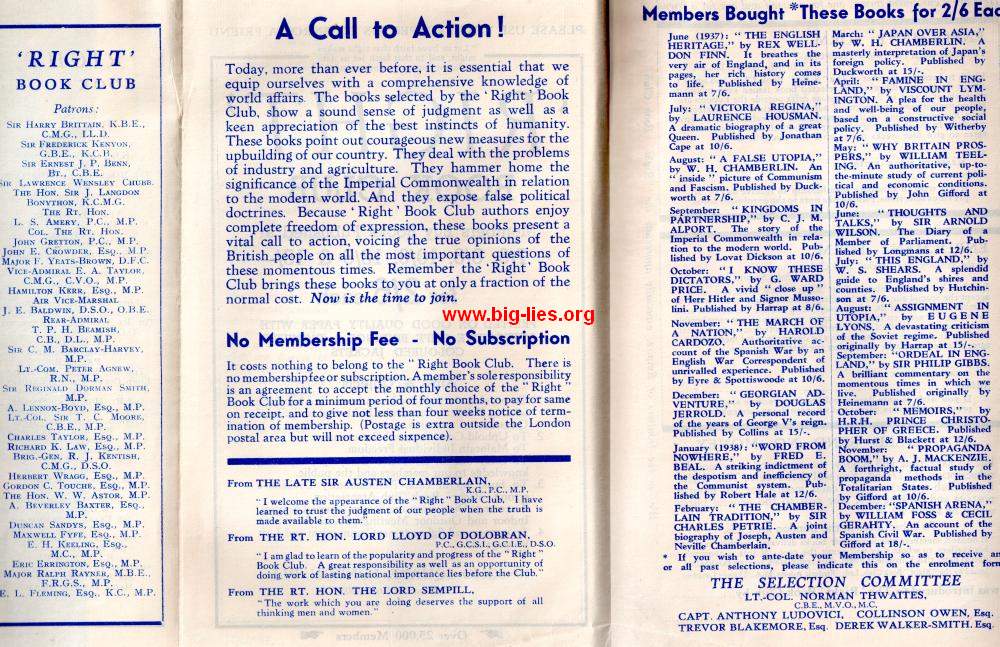 The Right Book Club. The Right Book Club. Above is a flyer probably from 1938: One of the books listed is Propaganda Boom allegedly by an A.J.Mackenzie, published in 1938. That book's blurb starts This book approaches problems of national and world politics from a new angle. It shows how human emotions are controlled and exploited by propaganda; how bloodless victories are won by the use of the psychological weapon which has become an invaluable ally of Statecraft. ... He discusses the great advance in the technique of propaganda since the Dictator States (especially Germany) began to build upon the foundations laid by Britain in the Great War; ... In fact, the book has nothing on new special techniques. It conflates Germany, Italy, the USSR and to a lesser extent Japan; there's no mention of Roosevelt, Churchill, Jewish finance, Jews in the USSR, or any of the other sinister gathering forces.
The 'Right Book Club' (Over '25,000 Members') advertised: Members Buy Books Published at 7/6, 8/6, 10/6, 12/6 & 15/- for 2/6 each
The series is clearly controlled opposition—none of the titles presents any serious consideration of world politics, militarism, Jewish policy. It is quite sickeningly dishonest, published purely to help warmongers insofar as they bothered with Britain. But the name suggests the club was invented to occupy an obvious publication gap with books mimicking serious comment.
Judging by their flyer, these books were unsaleable at normal prices: Members Buy Books Published at 7/6, 8/6, 10/6, 12/6 & 15/- for 2/6 each. These prices are in shillings and pence, of which there were 12 to the shilling: 7/6d is three times 2/6d, for example. The titles are a sad mixture, probably aimed at middle class useful idiots: Queen Victoria, England's countryside, lightweight looks at Britain; plus titles on the Spanish Civil War and USSR Communism, with of course no mention of Jews; muted material on the British Empire, destined to go; and so on.
These are worth studying as examples of what is meant by 'controlled opposition', in which Jews control a dialogue: not 'both sides', since the important material is entirely censored out; but what are presented as two sides—Hitler and Mussolini are 'these dictators', omitting Stalin; nothing about capitalism vs finance; nothing important about aristocracies. But 'Liberal' vs 'Conservative', 'Labour vs Conservative', or as here 'Right' vs 'Left', are givens.
The only book which established a name was "Assignment in Utopia" by Eugene Lyons, A devastating criticism of the Soviet regime, not exactly first with the news, and which of course has nothing on the reality of Jewish control, and Jewish finance, notably from Jews in the USA and Germany.
There's an enormous list of Patrons, Right Honorables, Sirs, Barristers, Rear-Admirals, Vice-Air Marshals, KGs, KCs, DSOs, MPs —probably to give an air of upper-class respectability, though I'd guess also suggesting the types who lent their names for a fee to shady company promoters. I notice the name of L S Amery, the very-crypto-Jew who wanted war. The five names on the selection committee are: Lt Col Norman G Thwaites, Capt Anthony Ludovici, Trevor Blakemore, Derek Walker-Smith, and Collinson Owen. A terrifying sad commentary on the intellect of Britain in the late 1930s.
Wikipedia states: A "Right Book Club" was launched as a conservative response to the LBC in 1937 by Edgar Samuel, who worked for the bookselling firm Foyle's. Probably it was way for Foyle's to dump unsold books and their back catalogue; no doubt Edgar Samuel wrote a misleading circular, and collected public names to attach to his list. I wonder if they were annoyed.
[ Top of page ]
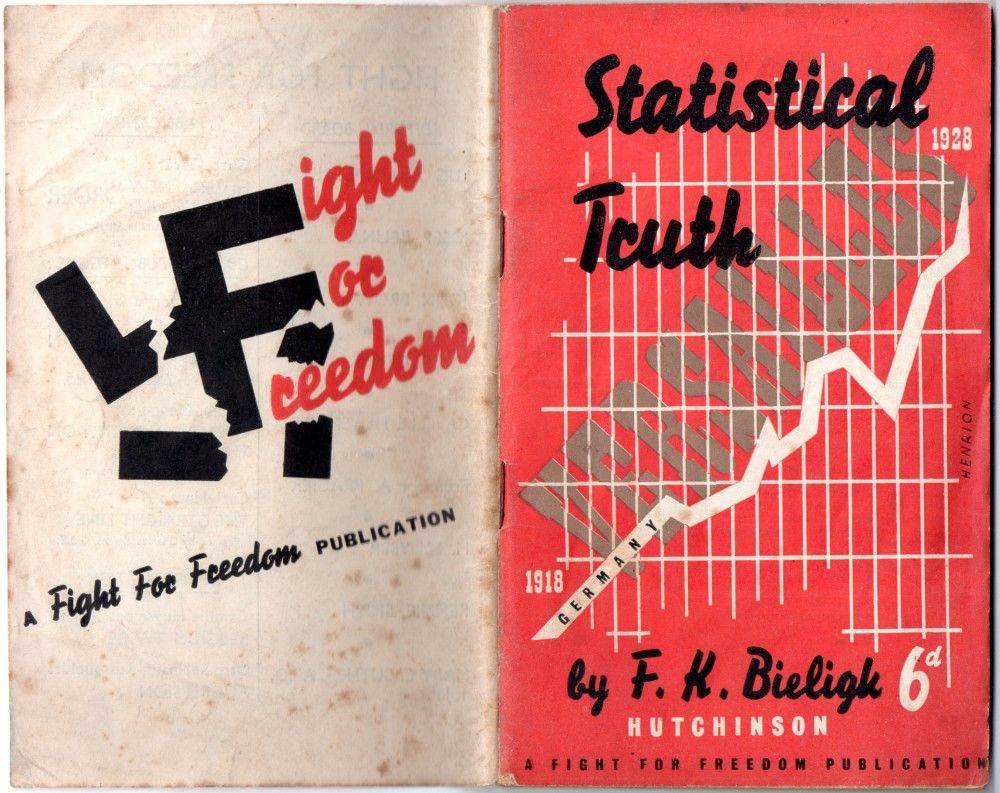 Cover design of Bieligk's Manchester booklet
Cover design of Bieligk's Manchester booklet
|
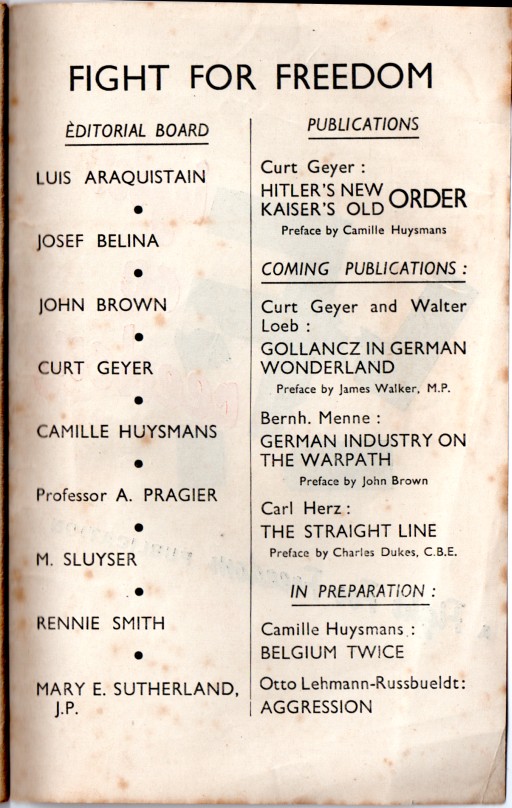 Jewish and fellow-traveller 'Editorial Board'
Jewish and fellow-traveller 'Editorial Board'
|
Statistical Truth (Feb 1942) by Fritz Beiligk. Published by Hutchinson & Co (London, New York, Melbourne) for 'A Fight for Freedom Publication', preface by George Gibson, anonymous Introduction, translated from German by E. Fitzgerald. vii + 9-64 pages.
It's often interesting to read Jewish propaganda booklets from specific dates—the then-current Jewish 'news' being condensed in one place. This booklet was probably a reaction to the 'Nazi-Soviet Pact' and of course the idea is to support war. The argument is I think unusual: it states that Germany after Versailles was in fact benefited, making Germany the leading exporter and productive country. It presents many figures, but with no basis for them; they may have been made up, in fact. Figures not given are for Germans starved to death, and deaths in the USSR under Stalin and other Jews. Headings include 'Germany better off than other countries', 'The inflation made them strong', 'The weak went to the wall', and GERMANY "GOLDEN" EPISODE OF LOCARNO.
The author is described as German, born in Saxony in 1893; he was obviously a Jew, thinking in terms of money. He is, as a Jew, naturally shocked that Germany was apparently prosperous; he says nothing I could see about Jewish bankers, who, I assume, changed policies several times, including starting and ending Germany's WW1. And—arguably—installing Hitler along with the helpful-to-them 'Führerprincip'.
The introduction recommends the 'new charter of human freedom' probably drafted by Jews at the time. The potted biography is typically Jewish—'Social Democrat', no mention of Jewish activities in Germany and Hungary just after WW1, 'lecturer in economics to the People's High School', etc.' Flight to Prague, then Norway, then Britain. Preserved in documentary aspic, probably worth reading and deconstructing.
|
[ Top of page ]
DIRECTORATE OF ARMY EDUCATION: BRITISH WAY AND PURPOSE [1942-1944]
[ Top of page ]
A series of 18 booklets produced as part of a three-hours-per-week education scheme, which unexpectedly seemed to expand. These were bound together in a red hardback. Most of the authors, or 'instructors' as they seem to be called, are identified. A fascinating compound of the desire to educate with propaganda of pretty much Tory type and uneasy forward look at 'reconstruction'; government white papers of 1944 and a few other reports are summarised over twenty pages or so. Also international treaties etc from 1941-1944 are summarised.
'Labour Party' is not in the index; looking back of course few people predicted the 1945 victory, and it seems fair to regard this as army propaganda. There's some interesting stuff comparing empires (absurdly, the British is here represented as tiny; in accordance presumably with the idea of telling them what they want to hear - there is no class in Britain, education is of the top quality, etc) and on supporting British economic interests in foreign countries (not worded like that) and Christianity and so on.
Here's a contents list. Note the complete absence of anything serious on Jewish influences, for which these simpletons prepared to kill. The dates suggest this may have been aimed at least partly at Americans in Britain.
BWP1 CITIZEN OF BRITAIN | BWP2 BRITAIN IN ACTION [Not original?] | BWP3 CITIZEN OF EMPIRE | BWP4 CITIZEN OF THE WORLD | BWP5 REVIEW | BWP6 THE SETTING | BWP7 THE RESPONSIBLE CITIZEN [Not original?] | BWP8 THE CITIZEN AT WORK | BWP9 THE HOME OF THE CITIZEN | BWP10 THE HEALTH OF THE CITIZEN | BWP11 EDUCATION AND THE CITIZEN | BWP12 WHAT MORE IS NEEDED OF THE CITIZEN? [Not original?] | BWP13 THE FAMILY AND NEIGHBOURHOOD | BWP14 PEOPLE AT WORK | BWP15 BRITAIN IN EUROPE | BWP16 YOU AND THE EMPIRE | BWP17 YOU AND THE COLONIES | BWP18 BRITAIN AND THE PEACE
More on this in How the Master Race Won World War 2 
Post Second World War
Pseudo-Academic Fake History: Edward Hallett Carr
Three examples originally published by Macmillan in 1950, 1952, and 1953.
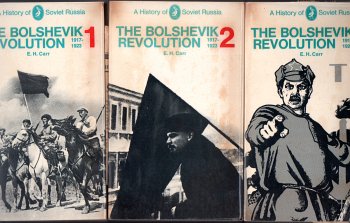
|
'A History of Soviet Russia. The Bolshevik Revolution 1917-1923' is Penguin Books paperback versions of E H Carr's books, published in 1966. E H Carr (1892-1982) is described by Wikipedia as a 'historian, diplomat, journalist and international relations theorist'. Of course he was. It's a saddening experience to read, or at look through, this stuff, embellished perhaps by reviews snipped from the junk press (Bryan Magee in The Times, Julian Symons from somewhere). I haven't bothered to check how much of Carr's projected series was written or published. Carr spent some of his life in Hampstead, perhaps inevitably. He gives some prefatory matter, with the usual rather embarrassingly effusive thanks. Volume 3 has a bibliography: Committees, Laws, Party Documents, Proceedings of this and that, works by Lenin. Marx, and the rest. Nothing on Jews, Jewish money, payments for such things as arms and ammunition, communications with New York Jews and financiers.
His book What is History? (1961; free online) was in the early 60s era in Ved Mehta's slender volumes of reportage.
|
[ Top of page ]
Nikolaus Pevsner. New Domesday Book of England
Nicolaus Pevsner 1902-1983
Attributed to Pevsner is a 46-volume series of county-by-county guides, The Buildings of England (1951–74).
Pevsner was of course a Jew, and his works in this series (one every six months) were first 'published by Penguin Books between 1951 and 1974' according to their Manchester volume of about 2000, then published by Yale University Press. Which credits six funding sources, including Sainsbury family charitable truss, the lottery, English Heritage and more.
This seems to be part of the Jewish victory of the Second World War, securing through the '50s and '60s intellectual guard over English buildings and the 'built environment' generally. The series is mentioned in 1960 in one of E J Hobsbawm's Jewish history. The RIBA (Royal Institute of British Architecture) awarded him a gold medal, I think in 1967. Nobody seems to have mentioned that English architects could easily have produced such works. The collection is something like a Domesday Book after 1950.
What seems to have happened is that (according to Wikipedia) two other Jews joined him in 'research'. I don't know their names. All cities, towns, and even quite small places had public libraries with their local archives, which would of course include documents on important buildings, sometimes including very detailed material on buildings, architectural plans, costs, craftsmen, and so on. It all seems innocent enough—collaborators investigating buildings, beauty, and truth.
The problem is that Jews re-inserted themselves into England after the English 'civil war' and took direct control of the City of London money system. The expenses of war plus the substitution of the Bank of England impoverished the English generally, and what followed involved in the 18th century/1700s redistribution of property with a building boom for the newly-enriched Jews and allies. How this was done—taking of English assets and the rest of it—was not to be investigated. It wasn't just Germany that had its records and legal decisions and patents and gold reserves rifled!
And this process unfortunately continues at the present day. The National Trust and English Heritage give minimum information on their properties. One guesses for example that the 18th century building boom was over-extended, leaving the new owners with impressive but unmanageable piles.
Consider a related issue, guide books to countries and towns, part of the 19th century newly-developed tourism interest. Baedecker in Germany seems to have been the leader, with condensed descriptions of towns and buildings. (The Railway Guides of Bradshaw are a British analogue). Benn's Blue Guides were another Jewish publication. John Murray was another. Guides to individual places had to be controlled, too. In this way blinkers/blinders were fixed on people.
Chief of Intelligence—typical spy 'faction'/thriller
After the war, the money-makers came out to play, while the Jews consolidated their gains in Europe, with looting, sex, and violence.
Victor Gollancz' 1951 spy book is part of a whole set of thriller genres, including detective stories, Ian Fleming's James Bond—though the Jewish Broccoli crop was unlike the original—and John le Carre  , endless 'intelligence' and spy junk, manufactured stories about 'Nazis', and the so-called 'Cold War'. The Jewish essential is that Jews in the U.S.S.R., U.S.A., and Europe should not be identified as a unit under any circumstances. In Chief of Intelligence Canaris must not be shown as part of a Jewish network, arranging among themselves the course of WW2. Whether it was in fact true is an irrelevance. , endless 'intelligence' and spy junk, manufactured stories about 'Nazis', and the so-called 'Cold War'. The Jewish essential is that Jews in the U.S.S.R., U.S.A., and Europe should not be identified as a unit under any circumstances. In Chief of Intelligence Canaris must not be shown as part of a Jewish network, arranging among themselves the course of WW2. Whether it was in fact true is an irrelevance.
Nor should war crimes, past and future, of their host countries, of which of course there were vast numbers. Nor should Jewish control of money, particularly over bankrupted Britain, France and Germany ever be mentioned. Much later, Spycatcher  still followed this line, though there are flickerings of awareness. The nuclear issue was another Jewish fraud, which I hope will slowly unfold, and which possibly directed more money to Jews than any other of their non-financial frauds. still followed this line, though there are flickerings of awareness. The nuclear issue was another Jewish fraud, which I hope will slowly unfold, and which possibly directed more money to Jews than any other of their non-financial frauds.
[ Top of page ]
The Communist Technique in Britain by Bob Darke.1952. 'Communism' is a code for Jews. This is a Penguin Special number S 160. 'Penguin Specials' were propagandist titles to draw attention to topics Jews were promoting at the time. Bob Darke
[ Top of Page ]
Penguin Special (S160)—cover design right—was published in 1952, by which time Darke (I presume this is a false name, to conceal 'Jewishness'. Real name not known to me) had been a Borough Councillor in Hackney for 18 years, before his resignation from the CP in 1951. In other words, he was a Councillor since about 1933. He must have been part of the Jewish movement supposedly against Germany, but in fact wanting war between whites in Europe.
As with all Jewish stuff, it's impossible to be certain of anything here. 'Darke' claimed to be a bus conductor; I haven't read this book carefully—quite likely Darke never wrote any of it, and his pay, violence etc, would not be recorded. It postdates the Empire Windrush Jewish start of 'coloured' immigration; maybe this had something to do with the planning behind the book. Darke's knowledge of Jewish fakes such as nuclear weapons, the invasion of Palestine, the role of synagogues, etc are unlikely to be present here.
It's online as a pdf file, less than 1MB: Click here for Penguin Special S160.
It's worth noting that there must have been collusion with the civil service, police, security 'services', MPs et al, just as now when these scum do nothing about white girls being raped, white boys being attacked, and so on.
[ Top of page ]
1956. The New Outline of Modern Knowledge. Ed Alan Pryce-Jones; with about 26 authors.
[ Top of Page ]
A small part of the Jewish race triumphalism after their victory of the Second World War, and the enormous white death toll which they successfully executed. 'Modern' knowledge of course means the Jewish interpretation of world events, and the parts played by Jews in them. The title is a reference to H G Wells: he complained in his Experiment in Autobiography that his book The Outline of History had been so popular that outlines—of this and that—proliferated between the wars. The dust jacket's verso blurb states that Gollancz's 1931 Outline of Modern Knowledge was 'one of the two or three most remarkable successes in the whole of our pre-war publishing. First issued in 1931, it had sold close on 100,000 copies by 1913, when it went out of print.'
But the 'social, political, economic, intellectual and artistic scenes had changed so vastly that something totally new was clearly required.' and 'not a single one of the contributors to the original Outline has contributed to this one.' I don't have a copy of the earlier book, edited by William Rose, probably a Jew. It is online, here  , and certainly contains interesting material on Jews and the USSR, Jewish money frauds, and Jews and future as seen in 1931—though they would need some detective work to find. , and certainly contains interesting material on Jews and the USSR, Jewish money frauds, and Jews and future as seen in 1931—though they would need some detective work to find.
This 'book is written expressly for the layman by eminent experts in the various fields..' Of course it was! Jews do their best to insert their 'experts'...
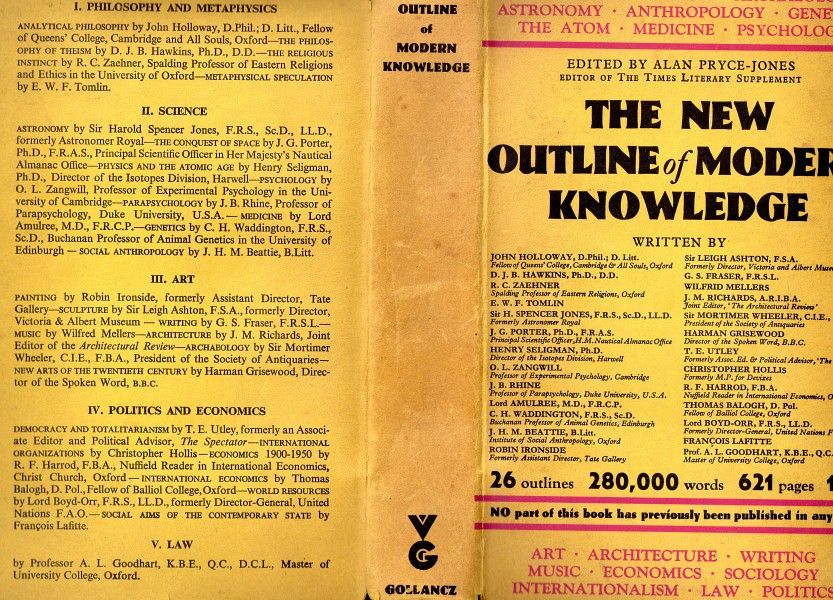 |
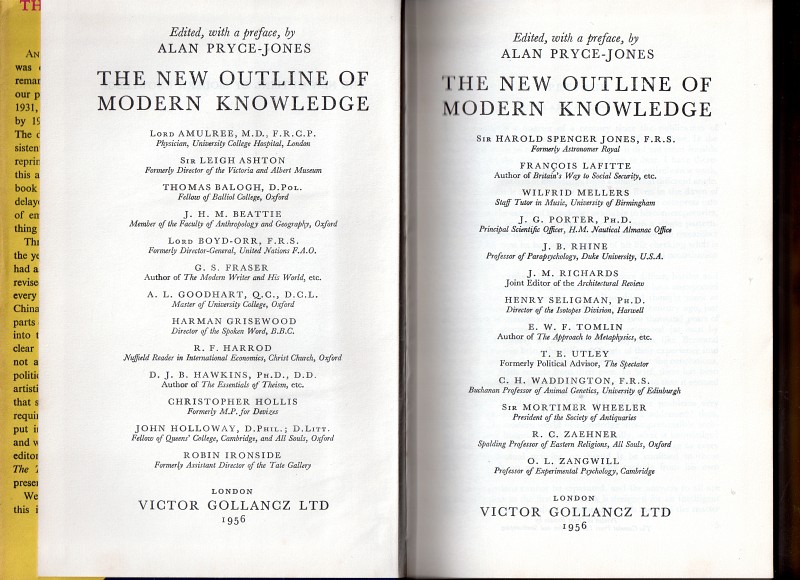 |
Victor Gollancz (hence the 'VG' logo): my 1956 copy of The New Outline of Modern Knowledge was updated, or changed, from An Outline of Modern Knowledge (1931; out of print by 1937, states the jacket). The older book, The Outline of Modern Knowledge, was edited by Dr William Rose, no doubt a Jew, and no doubt shows the propaganda thought suitable by Jews in the 1930s.
The 'New Outline' had an entirely new team of contributors and editor. As would be expected, Jews wrote the material on which Jews depended; in fact it's probably true that the way to identify Jewish frauds is to look for Jewish control. Thus for example we have Harrod on economics, with his trip through Marshall of the 1870s and much of the British 'industrial Revolution', and Keynes' General Theory, which ignores control of finance. International Economics was written by Thomas Balogh, a Hungarian Jew, I'd guess (without checking) thrown out in the 1956 Hungarian Revolution. He is keen to say the USSR was a new style of economy—the truth, that it was funded externally by Jews, who wanted their money back, being less attractive. Balogh says in effect Germany 'spent its way out of depression', a Jewish phrase designed to omit facts about Jews and money. But of course, it's so easy—any poor country can simply 'spend its way out'. Balogh was part of the disaster of Harold Wilson's 'Labour' government later. Henry Seligman writes on 'Physics and the Atomic Age'; R C Zaehner writes on 'The Religious Instinct'; Herman Grisewood of the BBC writes on 'The New Arts of the 20th Century', rather than the more accurate 'State Propaganda'. While these can be confidently assigned to Jewish propagandists, we also find Christopher Hollis on 'International Organizations' with its suggestion of Establishment collusions and lies.
The jacket of Gollancz's 1956 book, and the summary of the authors. The format is a 600 page hardback mini-encyclopaedia, probably aimed at young people in Britain as much as their elders. I can imagine many copies given as presents. From the propagandist viewpoint, anything remote is an easy target: Germany and Russia and China, for example. Anything puzzling makes potential propaganda: finance, religion, laws across the world, nuclear weapons and power, psychology, human races, for example. New things, such as internationalism and federations and international controls, are typical Jew interests. Some novelties were avoided: for example DNA and electron microscopy.
I'll simply draw attention to some of the contributors:
- R C Zaehner on 'the religious instinct', which needed care in approaching the Talmudic absurdities of Jews
- Henry Seligman, Director of Isotopes Division, Harwell. Isotopes exist; nuclear weapons and power need not be mentioned.
- O L Zangwill, Professor of Experimental Psychology, Oxford. Jewish pseudo-psychology was a long-established interest of Jews, noticeably under Stalin, with varied uses including deprecating concerns over Jewish cruelties worldwide.
- Thomas Balogh, Jewish economist and political theoretician in the same mould as Sidney Webb and Rufus Isaacs ('Lord Reading') and Harold Laski and very many Jews and crypto-Jews.
- Harman Grisewood of the BBC. He later ran Radio 3, the 'intellectual' BBC radio channel.
- R F Harrod. Rich. Just another dabbler in economics.
1990s Heinemann Hardback Library Series on Social Issues as Promoted by Jews
 Relic of 'Dutch William' and intrusion of Jews into England? Relic of 'Dutch William' and intrusion of Jews into England? I have an old copy of Philip Steele on Past and Present Riots. Published 1993 by 'Heinemann Library' of Heinemann Publishers, with an address in Oxford, England, presumably to sound academic. Branches listed in 17 towns, including Ibadan, Nairobi, and Harari.
 15 Worthy Lane Winchester SO23 7AB. Propaganda and lies HQ Their 'Library' imprint has hefty laminated cardboard covers, presumably to last. Generally, thin books have vast numbers of credits; this one was 'Devised and produced by Zoë Books Limited 15 Worthy Lane Winchester' and 'Edited by Charlotte Rolfe'. I was amazed to find that 15 Worthy Lane still has some activity; fronted apparently by Imogen, Christopher, and James Dawson.
'Key Dates' (see scanned page, to the right) give clues to the way such a book is assembled.
The book's date—1993—is about fifty years after WW2, just before the puppet Mandela was commissioned in South Africa, and soon after the 'Berlin Wall' was removed.
The Jewish propaganda of this book is fixed by its date. The overview Jewish claim is at the end of the book: 'As long as starvation exists, people will riot. As long as people suffer unjust government, they will riot. As long as people are brought up in ignorance or prejudice, they may act as bullies towards other people and cultures. It is sometimes not enough for individuals to stand up alone for what is right. They must join together on an international basis and work for peace.'
The Jewish claim is of course a fraud. Jews organise internationally, and what they mean is that collaborators can expect other Jews than local ones to act together, but 'working for peace' is unlikely to be the result! Whether people will riots, is far more uncertain than they claim: obviously, very often they didn't. And of course the idea that rioting will summon up food for starving people is suspect. And of course some 'cultures'—notably Jewish—are vicious and anti-human and deserve to be stood against.
Let's examine the interesting list of 'KEY DATES'. They are mostly in Britain; Jews work by partitioning the world by nations, languages, markets, or whatever. So similar books in French, Russian, German, South American, anywhere, will have different targets plus some identical targets.
Generally, all targets are Jewish in some way. Jews are interested in themselves. In this book, a slave revolt in mentioned, and vandalism [sic] in ancient Greece. I'd guess there are part of genuine or fake Jewish lore. Note the 'slave' issue: slaves [the word is based on Slavs, and here is anachronistic] were in some periods treated humanely, but in others—under Jews, for example—not. The smashing of statues sounds Jewish too—as witness Jew-funded 'Black Lives Matter' and 'Antifa' desperadoes.
Here things get interesting: Roman Catholics, and the much newer Protestants, fought savagely, probably financed on both sides by Jews.
Here we have the words of Miles W Mathis  , including ... Paris was ruled by the Jewish Medicis, we see it was a war of the Medicis against the Christian Church more broadly/ Catherine ordered the rich Hugenots murdered in the St. Bartholomew's Massacre not because they were Protestant, but beause they were prominent aristocrats and Christians. , including ... Paris was ruled by the Jewish Medicis, we see it was a war of the Medicis against the Christian Church more broadly/ Catherine ordered the rich Hugenots murdered in the St. Bartholomew's Massacre not because they were Protestant, but beause they were prominent aristocrats and Christians.
This suggests something new to me, that 'Blues against Greens' in Constantinople, and the Peasants' Revolt in England, were fomented by Jews, probably by Jewish money. Kristallnacht, since the fantasies of the Second World War appeared to have triumphed by 1993, is here claimed for the 'Nazi' government (see Hexzane527 for a very new view of the Second World War  . And very likely Jews are revealed to have been behind riots in Barcelona, India, the USA, and post-partition Pakistan. No surprises there. Though the 1985 football match in Belgium seems odd; a failed immigrant invasion Euro-project? . And very likely Jews are revealed to have been behind riots in Barcelona, India, the USA, and post-partition Pakistan. No surprises there. Though the 1985 football match in Belgium seems odd; a failed immigrant invasion Euro-project?
&nsp; The book mentions 'overthrowing the old order in Moscow', without discussing the role of Jews in the vast horror of the 'Soviet Union'.
Another disgusting Jewish action was Jewish control, by scum including Kissinger and Lyndon Johnson, of war crimes in Vietnam; the account here implies a Jewish-promoted event at My Lai was US troops rioting, when in fact the whole US policy involved large-scale landscape destruction, bombing and napalm, rapes and violence.
For the Real Meaning of Usury  (different page) check the idea that Jews and Roman Catholics collaborated, to keep money-making as a Jew monopoly. The frantic screeching against 'usury' seems to be just another piece of propaganda. (different page) check the idea that Jews and Roman Catholics collaborated, to keep money-making as a Jew monopoly. The frantic screeching against 'usury' seems to be just another piece of propaganda.
On the question of collaboration, if we look at large-scale violence and wars, I'd suggest there's a similar collaboration, certainly in modern times, with weapons made by heavy industry financed by very long-term loans and secret sales of assets.
The more Jews are involved, the less evidence there is that military leaders pursue their own policies. They are in effect mercenaries, not leaders.
Omitted material is so common that is must be viewed as the most common Jewish activity. In the past few centuries, the East India Companies of the Netherlands and England, Cromwell, the 'French' Revolution, the Opium Wars, wars in Africa, both World Wars and the invention of the USSR, are just a few ruthlessly censored topics.
More titles 'in the series' include in ISBN order:
KIDNAPPING, TERRORISM, SMUGGLING, REFUGEES, DISCRIMINATION, CENSORSHIP. And RIOTS, HOMELESSNESS in another sequence. Their capitals.
These are supposed to be '... Social issues of today set in the context of history'. Note that war, mass murder, starvation are not included. There's no hint that Israel is a rogue state. And nothing on media lies.
I leave it to the reader to try to work out what events are being flagged, in addition to the events which are ignored.
Out of curiosity, I looked up Philip Steele—easily done in the age of Internet. I think I counted 240 books, only, to be fair, about five a year, though who knows the final total or the accuracy of the attributions. Most of the titles above are attributed to Steele. So is The Holocaust: The Origins, Events, and Remarkable Tales of Survival, a biography of Newton, I wonder why pyramids were built ... presumably a hack writing to order. Less anonymous than the Jewish-owned press!
|
Just a few notes on a Heinemann advertising page taken more or less at random. I recommend this sort of thing to relative newcomers to revisionism. Probably at first sight the titles seem unexceptionable, and appear serious—not many cover designs of sex and violence.
Let's take a look (though I haven't checked names) and do simple analysis:
E L James is stated to be a woman author, of the 'Grey' series. Her work has been criticised as showing lack of discernment on the sources of money. And on the grounds of the absurd sexual oddities. A formal attack on this sort of thing is the connection of Jews with prostitution and the weakening of traditional bonds There may of course deserve to be weakened. Very many people have no grasp of the fact that there is a definite Jewish policy—for many decades male homosexuals were praised, for example, ignoring factual material.
James Patterson is what's described as a 'thriller writer'.
Stormzy appears to be a Nigerian, described as 'a British rapper, singer and songwriter'. Jew control of music should be noted, along with promotion of blacks, who of course are pathetically grateful.
Harper Lee is famous for To Kill a Mockingbird and is or was noted for always living in white communities.
Tom Hanks, an actor, has appeared in more propaganda films than most actors. Check for yourself.
Robert Harris is a pseudonym. He has written, allegedly, many anti-German popular books.
I don't think I've heard of Tim Peake, but the title given to a book suggests he's part of the NASA fraud.
|

|
 |
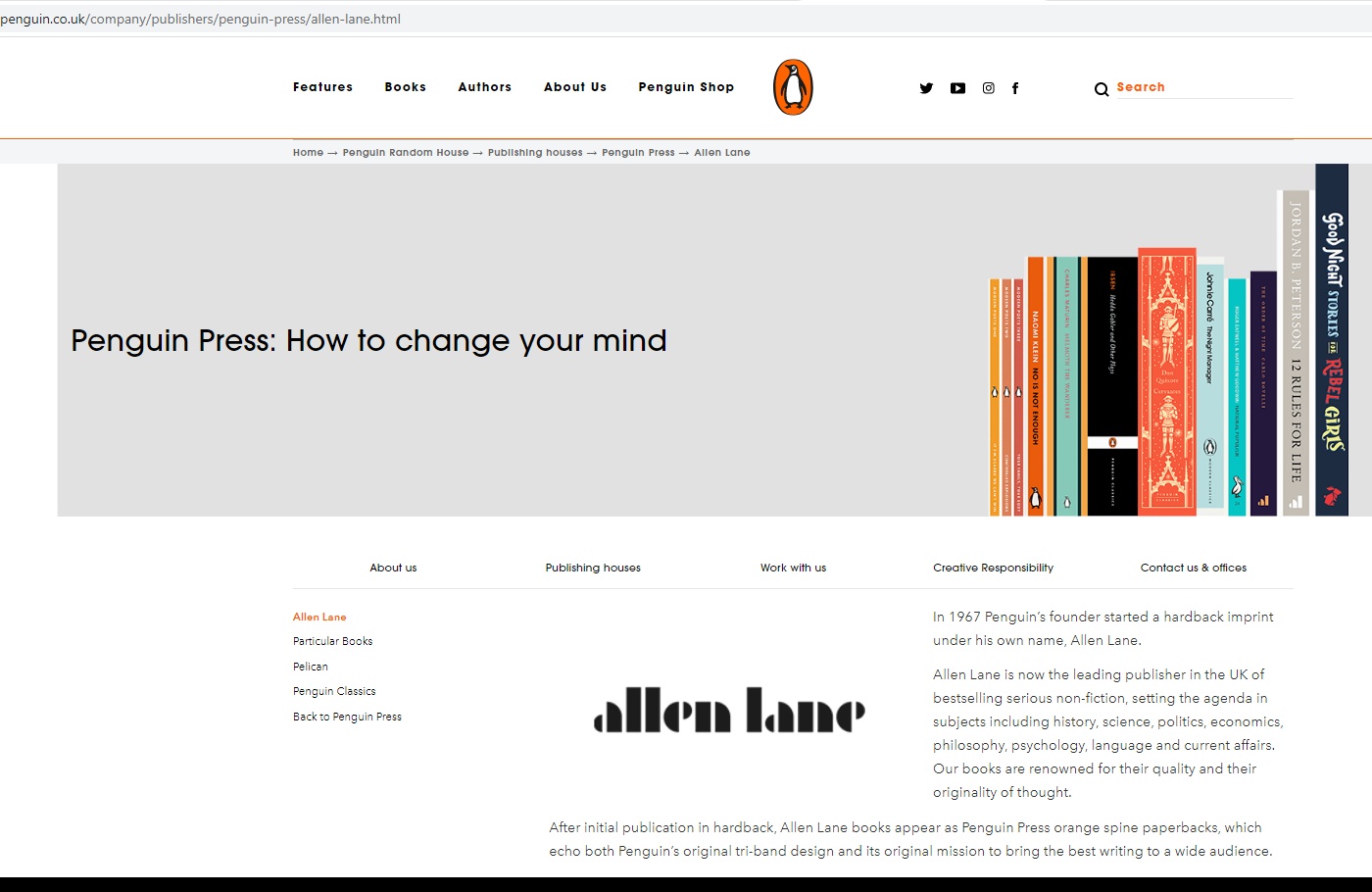 |
2000: David Irving vs Lipstadt & Penguin Books
I decided to make the upper limit 2000, increased from 1993, making the interval end roundly at the new century.
David Irving sued Lipstadt (a hack writer) and Penguin for libel. A long trial, lasting 33 days. I was there much of the time; here's my detailed report on Irving vs Lipstadt & Penguin Books.
RW: Finished version first upload 2015-01-24 to 28. Right Book Club added 2017-07-11. Home link 04-Oct-2017. Wells link and James Parkes Penguin added 5 Oct 2017. Unwin and Watts added 6 July 2018. Bieligk added 24 July 2018. Parkinson on Marx and the Webbs added 24 August 2018. Penguin Special S160 added 2 March 2020. Cole on Europe etc 13 May 2020. Gollancz references 20 May 2020. This tidied version 15 June 2020. Heinemann Aug 13 2020. Addition of link sign for other pages, small corrections, and Allen Lane death Dec 23 2021. Addition of David Irving libel prosecution, and Nicolaus Pevsner on architecture, May 2023 Top of Page
|

 Fake pacifist Jewish-concern book, which misled many peace-inclined people. Part of the Jewish propaganda leading to the Second World War with Germany. However, it had the merit of directing attention to economic causes of wars.
Fake pacifist Jewish-concern book, which misled many peace-inclined people. Part of the Jewish propaganda leading to the Second World War with Germany. However, it had the merit of directing attention to economic causes of wars.
 Jewish money enabled the purchase of partly-educated Britons and crypto-Jews. The 'Labour' Party had many people with public-school education who could find no other paid work. (Note the absurd list of detective stories by both Coles).
G D H Cole & M I Cole: The Intelligent Man's Review of Europe To-Day (published 1933) published by Victor Gollancz Ltd, London.
Jewish money enabled the purchase of partly-educated Britons and crypto-Jews. The 'Labour' Party had many people with public-school education who could find no other paid work. (Note the absurd list of detective stories by both Coles).
G D H Cole & M I Cole: The Intelligent Man's Review of Europe To-Day (published 1933) published by Victor Gollancz Ltd, London.
 look at her qualifications and consider what knowledge she really had of then-modern science and industry, and then-modern finance, and then-modern law. And war.
look at her qualifications and consider what knowledge she really had of then-modern science and industry, and then-modern finance, and then-modern law. And war.
 PENGUIN SPECIALS at the end of 1938. Picture (left) shows the back cover of Angell's THE GREAT ILLUSION - NOW, itself a Penguin Special. All these books were published by Penguin. Note that one book in the series—on Palestine—was cancelled. It's easy to guess reasons for this. Here's a rough guide to these eight titles.
PENGUIN SPECIALS at the end of 1938. Picture (left) shows the back cover of Angell's THE GREAT ILLUSION - NOW, itself a Penguin Special. All these books were published by Penguin. Note that one book in the series—on Palestine—was cancelled. It's easy to guess reasons for this. Here's a rough guide to these eight titles. The intellectual life of the British Labour Party is fairly represented by the story of the Left Book Club. This was founded by Victor Gollancz in 1936 and reached its maximum membership of 60,000 in the following year. Some sixteen hundred discussion groups were organized and there was even a rally in the Albert Hall. Victor Gollancz (1893-1967) was a humanitarian Jew of great energy who had been managing director of Benn's, the publishing house which pioneered the sixpenny paperback. He founded his own firm in 1928 and had an immediate success with Journey's End by R. C. Sherriff. [Note: this was a lachrymose and sentimental look at deaths in the First World War trenches; a similar book was Neville Shute's On the Beach dealing with a hypothetical 'nuclear war'.] His aim in founding the Left Book Club was to make a synthesis of socialist ideas, create a Popular Front and 'stop Hitler without war'. Books published for the Club numbered about 247 in all, the first, Out of the Night, appearing in 1936 and the last in 1948. The volumes were accompanied and explained in a monthly periodical called Left News which flourished over the same period. Authors who contributed to the series included Sir Richard Acland, Clement Attlee, Emile Burns, A. Fenner Brockway, G. D. H. and M. I. Cole, Sir Stafford Cripps, Victor Gollancz himself, J. B. S. Haldane, Harold Laski, Philip Noel-Baker, George Orwell, R. Palme Dutt, Stephen Spender, S. Swingler and R. H. Tawney. The books published were mainly concerned with immediate events and have had little circulation in later years. George Orwell's book, The Road to Wigan Pier (1937), is perhaps the only Left Book Club work to be classed as a work of literature. The most prolific author in this series was John Strachey, with seven titles, next to him G. D. H. Cole with six and Victor Gollancz himself with four.
The intellectual life of the British Labour Party is fairly represented by the story of the Left Book Club. This was founded by Victor Gollancz in 1936 and reached its maximum membership of 60,000 in the following year. Some sixteen hundred discussion groups were organized and there was even a rally in the Albert Hall. Victor Gollancz (1893-1967) was a humanitarian Jew of great energy who had been managing director of Benn's, the publishing house which pioneered the sixpenny paperback. He founded his own firm in 1928 and had an immediate success with Journey's End by R. C. Sherriff. [Note: this was a lachrymose and sentimental look at deaths in the First World War trenches; a similar book was Neville Shute's On the Beach dealing with a hypothetical 'nuclear war'.] His aim in founding the Left Book Club was to make a synthesis of socialist ideas, create a Popular Front and 'stop Hitler without war'. Books published for the Club numbered about 247 in all, the first, Out of the Night, appearing in 1936 and the last in 1948. The volumes were accompanied and explained in a monthly periodical called Left News which flourished over the same period. Authors who contributed to the series included Sir Richard Acland, Clement Attlee, Emile Burns, A. Fenner Brockway, G. D. H. and M. I. Cole, Sir Stafford Cripps, Victor Gollancz himself, J. B. S. Haldane, Harold Laski, Philip Noel-Baker, George Orwell, R. Palme Dutt, Stephen Spender, S. Swingler and R. H. Tawney. The books published were mainly concerned with immediate events and have had little circulation in later years. George Orwell's book, The Road to Wigan Pier (1937), is perhaps the only Left Book Club work to be classed as a work of literature. The most prolific author in this series was John Strachey, with seven titles, next to him G. D. H. Cole with six and Victor Gollancz himself with four.
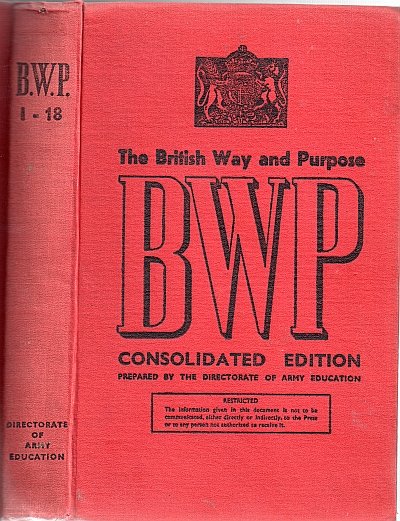
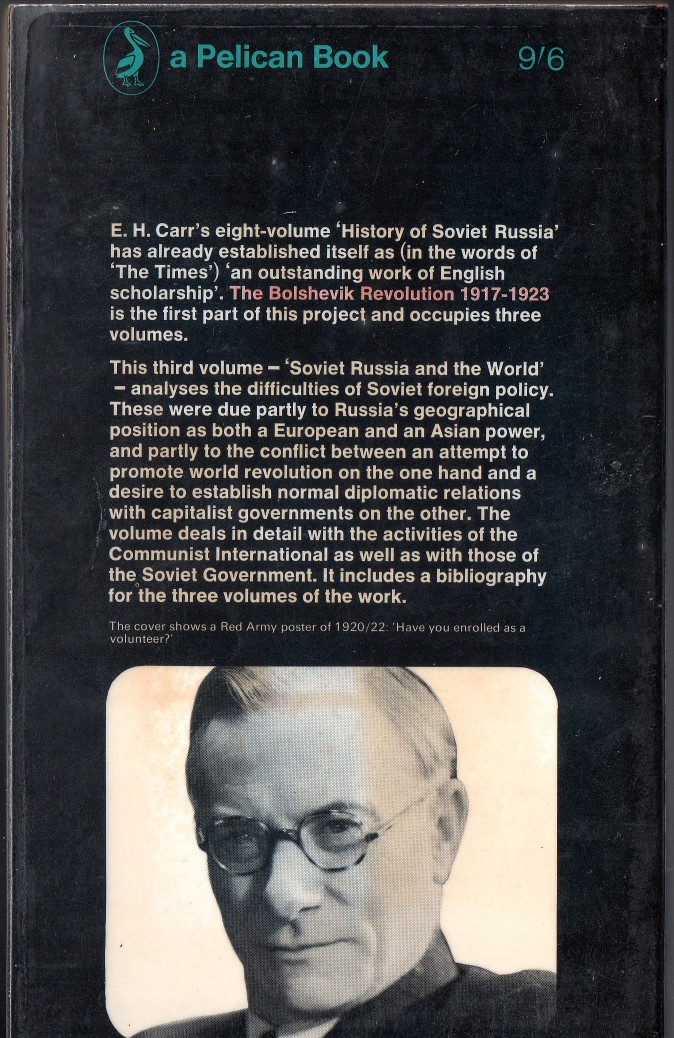
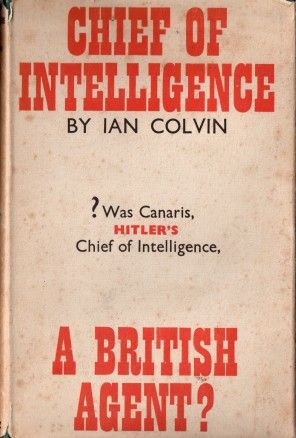
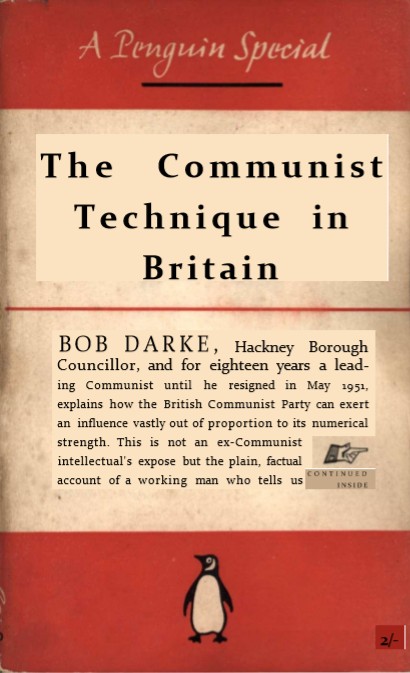
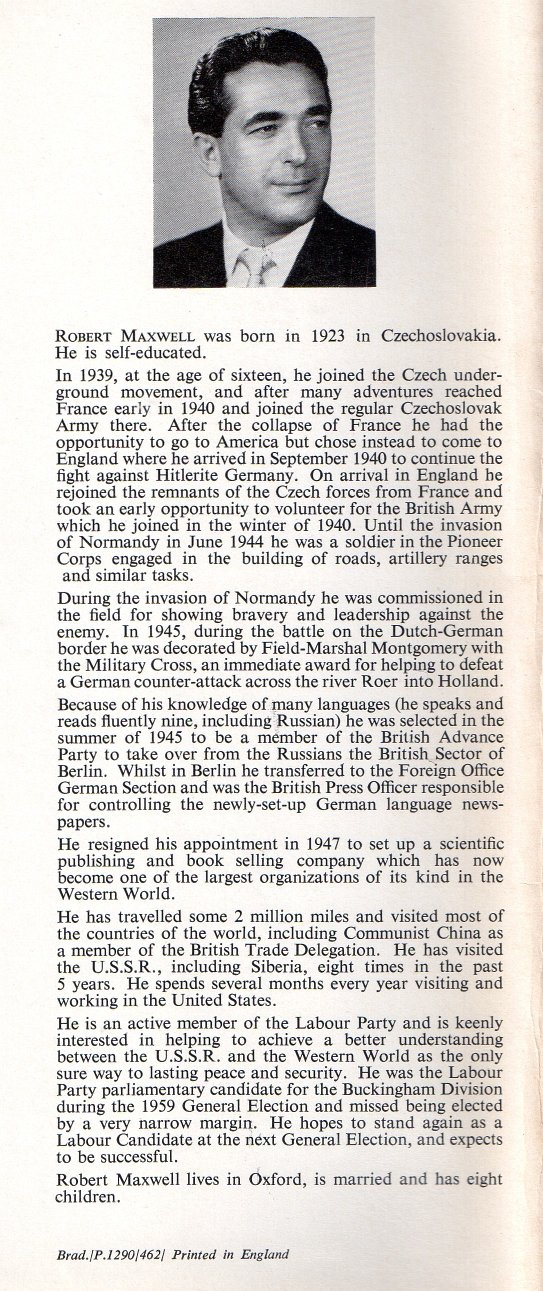
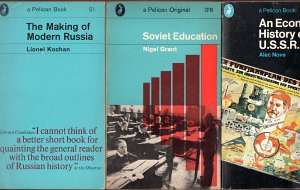
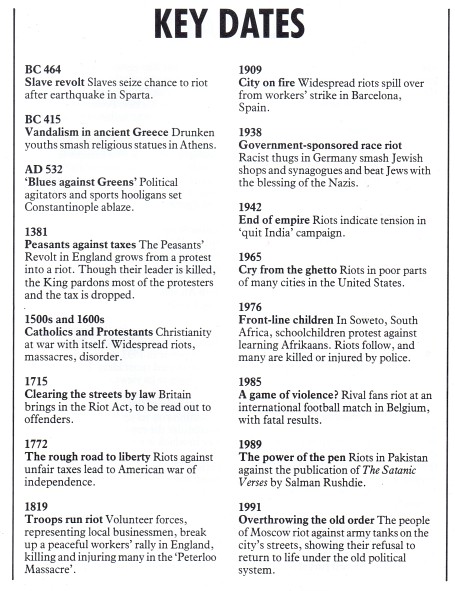


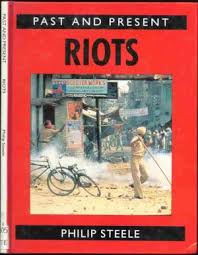




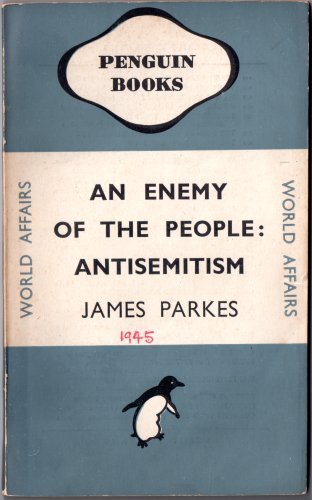







 Jewish and fellow-traveller 'Editorial Board'
Jewish and fellow-traveller 'Editorial Board'



